|
#2682133 - 02/28/09 06:49 PM
 While we're waiting for CloDo. Final instalment and end of thread. 14 5 2011.
While we're waiting for CloDo. Final instalment and end of thread. 14 5 2011.
|
Joined: Nov 2005
Posts: 3,072
RedToo

Senior Member
|

Senior Member

Joined: Nov 2005
Posts: 3,072
Bolton UK
|
Hi all, I've just acquired this book: Winged Words, published in 1941. It contains the verbatim transcripts of some of 150 broadcasts made by RAF officers, airmen and the WAAF for the BBC. They make fascinating reading, complete with misconceptions of the time. Some of them mention operations and personnel familiar to us, others are long forgotten. I thought posting them here might make the wait for BoB SoW seem a little shorter. The first is from December 1939, the last February 1941. I'll try to post one a week. Without further ado here is the first. RedToo. December, 1939 CHRISTMAS DAY IN COASTAL COMMAND BY A SQUADRON LEADER, R.A.F.V.R. As you can imagine, the Royal Air Force in Great Britain has had to be on its toes over Christmas. This has been particularly true of the crews of Coastal Command aircraft. Co-operating with the Royal Navy, they are responsible for the safety of shipping on the seas of Western Europe. For them, there could be no holiday . . . Enemy submarines for ever on the prowl . . . the possibility of German warships breaking out from their bases . . . watch to be kept on the great convoys of merchant vessels on their way to Britain . . . the traffic lanes to be searched for mines. Since the war began, the aircraft of the Coastal Command have flown fully four million miles, on watch and guard over the North Sea and the Atlantic. In other words, in four months, the crews of this Command have covered a distance equal to more than 165 journeys round the Equator. A substantial part of this immense air mileage has been contributed by the Royal Air Force flying boats, many of which are flying boats of the type used on the Empire routes for the carriage of passengers and mails. In outward appearance these Royal Air Force and Empire flying boats are identical. But the interior furnishings are very different. In one, as you know, there are armchair seats, tasteful dining-rooms, and comfortable sleeping quarters. But the inside of an R.A.F. flying boat is an arsenal, with batteries of guns on both decks and a ton of bombs slung from a kind of overhead railway on the roof, ready to be run out for easy dropping from the wings. I spent Christmas Day in one of these flying boats on an anti-submarine and convoy protection patrol of upwards of 1,500 miles over the Atlantic. The crews of the aircraft were aboard, as usual, before dawn, and took off in the darkness so that advantage might be taken of every minute of daylight at sea. Before we boarded the flying boat, pilots and navigators received their instructions for their Christmas Day's work in a small hut which is the Operations Room of the Squadron. Orders were read to them in front of a big map of the Atlantic seaboard on which seven white graveyard crosses are pinned. Each cross marks the spot where a German submarine has been destroyed by a flying boat of this single squadron. Just before we left to embark, an orderly from the wireless station brought in a sheaf of messages. They were Christmas greetings from the pilots, crews and passengers on Empire flying boats which are still maintaining, just as in peacetime, their twice weekly, two-way services between Britain and Australia, Central Africa, and South Africa. These messages of goodwill to the Royal Air Force flying boats bad been sent from their sister flying boats while they were in the air over the Dutch East Indies, Singapore, Malay, Thailand, Burma, India, the Sudan, Egypt, Kenya and Uganda. Reading them in that tiny hut on the English shore of the Atlantic on Christmas morning, one could not help feeling some pride in the fact that the British Empire's Command of its civil flying routes is still completely unchallenged. There was another Christmas Day message. It came from the Australian crews of flying boats now working with the Royal Air Force from a station further north on the west coast of Britain. By dawn, which came in saffron splendour, we were having breakfast nearly 200 miles at sea. A FULL breakfast�grapefruit, bacon, sausages, eggs, coffee and toast, served piping hot from the galley next door. The cook reported to the young captain of the flying boat, a youth of twenty-two, that he wasn't satisfied with the behaviour of the ice-box in the galley. Why he should be worrying about an ice-box 2,000 feet over the Atlantic on a freezing Christmas morning, neither the pilot nor I could understand. Back in the control cabin which, like the gun turrets, was decorated with holly and mistletoe, we saw the answer to Germany's propaganda claim that the Nazi sea and air fleets are blockading Britain. In the first flush of day, scores of heavy-laden merchant ships from Australia, New Zealand, Africa and South America were riding the seas triumphantly to Britain. Every mile or two for the rest of the day we came on more ships going on their business, unaccompanied and unafraid. But our special job for Christmas Day was to find and protect a convoy which had been assembled at a rendezvous from all parts of the world and which an escort of French warships was bringing along. We knew that the convoy was about twenty hours late, and that it had gone far off the course set for it because of bad weather and threatened submarine attack. We could only guess the course it was taking. The ships themselves couldn't help us to locate them. They had, of course, to keep wireless silence so that their position might not be betrayed to lurking U-boats. Our flying boat combed the sea for 5 50 miles. Then we found the convoy. Rather, it nearly found us! Cloud had become so dense and low that often we could see only the nose of the flying boat and the wing-tip floats. I heard the pilot beside me whistle sharply. "Blimey!" he said as he lifted the boat suddenly from the height of sixty feet at which we had been flying. In the nick of time he had avoided the masthead of a ship which had appeared beneath the wing. As he climbed to starboard, we saw another mast . . . then another . . . then mast after mast. His anxious look gave way to a happy smile. He took his hand from the joy�stick and cocked his thumb. He was over the lost convoy. Through the thick mist we could see the columns of ships flashing Christmas greetings to us with their lamps. The bank of low cloud which blanketed the sea was now more than 200 miles square. We flew through it for a couple of hours and then located the British destroyers which were waiting to take over from the French warships. By lamp signals we gave them the position and course of the convoy. Our Christmas Day job was now half done. We had to fly back to the convoy, and for the remaining five hours of daylight, sweep the sea ahead of it for enemy submarines. As quickly as it had fallen, the thick belt of mist vanished. Wintry sunshine filtered into the flying boat as the crew sat down, two at a time, to a quick Christmas dinner of soup, goose and plum-pudding. Until dusk we cruised for 500 miles in the path which the convoy would take to England. There were no submarines about. At least, if there were, they kept their heads down for fear of our bombs. And a U-boat submerged at sea is as useless as it would be in its base in Germany. Part of the job of the Coastal Command of the Royal Air Force is to destroy them or, failing that, to keep them submerged. Twice the look-out men on our flying boat gave the "action" call to bring the crew to submarine stations. They did so by pressing a button which caused an electric hooter to scream "DAH-DE-DIH-DI-DOH" throughout the boat. Both times a sea marker was thrown overboard by the lookout men, and the pilot made the flying boat stand on its wing-tip so that the sea was like a wall in front of us, with the horizon over our heads. The pilot's fingers caressed the bomb switches. But no bombs fell. As he swept round the column of smoke rising from the sea-markers, he decided that the ripples of water among the "white-horses" which the look-out men had seen were not the footprints of a submarine periscope, but only the foam on the trail of drifting wreckage. We had left the English coast in the morning black-out against air raids. Twelve hours later we came back to it�again in complete darkness, just in time for a second, and more leisurely, Christmas dinner. To-day, Boxing day, the flying boat is out again over the Atlantic, guarding the great convoy of merchant ships on another day's safe march to England. Its crew and the crews of the other flying boats of the Squadron have asked me to offer you their good wishes. ![[Linked Image]](http://img.photobucket.com/albums/v369/RedToo/Sunderland.jpg) A Sunderland taking off.
Last edited by RedToo; 05/01/18 08:06 PM.
My 'Waiting for Clod' thread: http://tinyurl.com/bqxc9eeAlways take sides. Neutrality helps the oppressor, never the victim. Silence encourages the tormentor, never the tormented.Elie Wiesel. Romanian born Jewish writer, professor, political activist, Nobel Laureate, Holocaust survivor. 1928 - 2016. Indeed the safest road to Hell is the gradual one - the gentle slope, soft underfoot, without sudden turnings, without milestones, without signposts. C.S. Lewis, 1898 - 1963.
|
|
#2685626 - 03/05/09 07:18 PM
 Re: While we're waiting for BoB SoW: WWII BBC RAF Broadcasts
[Re: samegate]
Re: While we're waiting for BoB SoW: WWII BBC RAF Broadcasts
[Re: samegate]
|
Joined: Nov 2005
Posts: 3,072
RedToo

Senior Member
|

Senior Member

Joined: Nov 2005
Posts: 3,072
Bolton UK
|
Part 2. I've included a couple of photos from the other side to balance things up a bit. RedToo. January, 1940 A TALK BY THE SQUADRON COMMANDER OF A BOMBER SQUADRON AIRCRAFT of my Squadron, with others, have been chosen to take part in raids on Brunsbuttel, on Heligoland and on Wilhelmshaven since the war began. We are always in a state of readiness, but big shows such as they were, entail very careful planning and preparation. It is essential that everybody knows exactly what his job is. Each man must play his part to the best of his skill and ability. That is his duty to the other members of his crew and to the formation as a whole. We pride ourselves that we have got a fine team spirit among our bomber crews in the Royal Air Force-and it's the team spirit that counts on these occasions. Well, first of all for the preparation. When the order for a raid comes through-and I have usually found that to be at a time when nearly everyone is in bed-Headquarters give us a zero hour, by which time everything has to be on the top line, and we stand by ready to take off. My Flight Commanders decide with me who is going. The plan of operation is fixed in all our minds. Such details as the route to the target, and the way we are coming back, the type of flying formation, the order of attack, methods of defence-all those things are settled. We have planned between us, for every contingency we can foresee. Deputy leaders for each section of the formation have been appointed in case we have trouble of any kind. We're up some hours before dawn, and have a hurried break-fast before going across to the hangars. I'm afraid I cannot appreciate bacon and eggs at that time of the day. The armament people have been hard at work during the night. They've got the job of bombing up the planes and loading up with ammunition. Final instructions have to be issued to all crews and there are the usual last-minute jobs to be done. There seem to be a hundred and one things to check up on. It's really a bit of a relief when, finally, one gets in the air and settled down on the course. Everyone will be busy to start with. The air gunners checking and testing their guns, the navigator setting out his maps on the chart table, and the wireless operator listening for any messages that may be passed to us. Once we are in the air, he does not transmit for fear of disclosing our position. As for the Captain, he's got plenty to do. We know it'll be a couple of hours or so before we're in sight of the German coast. But you can well imagine that everyone sits up and takes notice as we get nearer. All aircraft close up tighter in case of attack. Sixty miles out from the German coast, we get the warning from my rear gunner: "Fighter on the port beam." There's another one to starboard, too, both of them a couple of miles away and flying roughly at the same height and speed as we are. One realises that they're signalling our altitude and speed to the enemy guns. We can now see the line of the coast thirty or forty miles ahead-only a few minutes' flying. We get through with very little fighter opposition, but then as we get closer to the target, we come under heavy anti-aircraft fire. The stuff bursts all round. One's surprised to find, the first time, how detached one is about it. Even to the point of being critical of the gunnery. The formation opens out and we do a bit of dodging- "Evasive action," they call it in the official reports. Now we have spotted our target-very small, too, at the height we're flying-and we're making straight for it. The signal for attack is given and the bomb doors are opened. The navigator has now become the bomb aimer. He passes correction of course to the pilot, making allowances on his bomb-sight for our height and speed and also for the wind. When his sights are on the target-which, at the speed we are travelling may be a mile or two ahead of us-he moves over a lever to release his bombs. The other aircraft bomb in sequence and in a predetermined order. We've then completed the task we were sent out to do. Now we've got to get back. Bomb doors are closed and throttles opened. The aircraft close up from their open bombing formation to meet the fighters we can see above waiting for us. As soon as we're out of range of the A.A. guns the fun begins. If there's any sun, the fighters will almost certainly have manoeuvred to a position where they can make their first attacks with the sun behind them. It's an old dodge, but always a good one. On one raid the squadron was in, there must have been about fifty German fighters. They were buzzing about like flies above us. In that particular scrap they made between sixty and seventy separate attacks. These attacks developed in quick succession from both sides and from astern. Bright flashes went streaking past the wings. These are tracer bullets. Rather an attractive sight, I suppose, if they weren't quite so unfriendly. This is the test for our own air gunners. Keen as mustard, these fellows, and it's a comforting thought to the other members of the crew to know that they have such good men behind the guns. On this particular show, despite the fact that we were out�numbered by more than two to one, we more than held our own. The fight lasted over half an hour, with about two enemy attacks a minute. It's good to know that all the time the fight's going on, the fighters are being drawn farther and farther away from their own bases, and must therefore soon turn back, while every minute brings our formation nearer home. Gradually the intensity of the attack dies away. When you no longer hear the sound of your own guns, you know it's all over. This is confirmed when one of the chaps in my plane says: "Well, that's that, sir. Let's go." It's a natural reaction, I suppose, that everybody should become more than usually friendly and attentive now that the tension is relaxed. Soon the rations-a hot drink and some chocolate-are passed round. So much has happened in so short a time that it's only when the formation has settled down on a course for home that one has time to think it all over. One starts checking up on crew casualties and damage to aircraft. We jot down notes of the more important points of the raid and the scrap, which will be of assistance in making out the report when we get back. We fly on steadily and the English coast is a very friendly sight when, at last, it appears ahead. Before long we are circling the aerodrome to land. It is good to be safely home again.  Hannes Trautloft and his men of IV./JG 132 before the invasion of Poland, 1939. Bf 109E-1 Nr 4072 carries interesting red and white markings on fuselage and spinner.  Despite the political tension during summer 1939, there was always time for a game of 'skat'.
Last edited by RedToo; 03/05/09 07:29 PM.
My 'Waiting for Clod' thread: http://tinyurl.com/bqxc9eeAlways take sides. Neutrality helps the oppressor, never the victim. Silence encourages the tormentor, never the tormented.Elie Wiesel. Romanian born Jewish writer, professor, political activist, Nobel Laureate, Holocaust survivor. 1928 - 2016. Indeed the safest road to Hell is the gradual one - the gentle slope, soft underfoot, without sudden turnings, without milestones, without signposts. C.S. Lewis, 1898 - 1963.
|
|
#2690427 - 03/13/09 08:01 PM
 Re: While we're waiting for BoB SoW: WWII BBC RAF Broadcasts
[Re: RedToo]
Re: While we're waiting for BoB SoW: WWII BBC RAF Broadcasts
[Re: RedToo]
|
Joined: Nov 2005
Posts: 3,072
RedToo

Senior Member
|

Senior Member

Joined: Nov 2005
Posts: 3,072
Bolton UK
|
Part 3. With some more Luftwaffe photos from the Polish campaign. April, 1940 RAIDS ON NORWAY BY A BOMBER WING COMMANDER AND SQUADRON LEADER This was a special job of work which we'd had allotted to us, and we shared the task with other squadrons. We ourselves made four raids in six days. The first was a raid over Bergen. We had had a report that there were two German cruisers in the fjord. We found one cruiser alongside the shore, but didn't attack her for fear of injuring Norwegians. The other ship seemed to be making towards the shore about as quickly as it could, probably guessing that we would not attack it there� but it did not get there in time. The aircraft, flying low for greater precision in bombing, got a very hot reception from anti-aircraft guns of the ship and on the shore, but they pressed home the attack. It was the leader of the formation who got in a direct hit on the stern of the cruiser. Other bombs fell very close. Another bomber squadron, we believed, scored a hit on the same ship that evening, and, as announced by Mr. Churchill, the cruiser has not been heard of since. We didn't get away unscathed. One aircraft was hit by pom-poms and a shell took a nasty chunk out of its starboard wing. The pilot was afraid that one of the tyres had been punctured as well and was trying to hurry home so as to make a landing before dark, while all the time the section leader�seeing this big hole in the wing�was aiming at preventing him going too fast because he was afraid that flying at any sort of high speed would increase the damage. Still, he got down without mishap in the end. Back at the base we had been making all sorts of emergency arrangements in case there were any casualties, but, fortunately, they proved unnecessary. Naturally we were eager to know all about what had happened, but most of the fellows seemed to have been so impressed by the beauty of the Norwegian scenery that at first it was difficult to get them to talk about anything else. The following evening we called in on Stavanger aerodrome. As we knew there were fighters there, we planned to arrive in the failing light to make it more difficult for them to intercept us. We were also relying on the clouds to cover our approach, but it rather let us down, so we descended to water level. We thought that there we should be less likely to be seen. That attack really was a magnificent sight. The sort of thing that will always remain in one's memory. We had split up into sections of three. Each section seemed to be trying to race the other to the target. We were simply streaking across the water. The other section�not the one I was in�got there first. The Germans put up a terrific barrage over the target before we got there, but our chaps simply went straight in. We flew across that aerodrome just below 1,000 feet and at about 200 miles an hour with our front and rear gunners letting loose their full fire and the bombs exploding in our wake. With different-coloured tracer bullets coming up and our own tracer bullets going down, it was like a gigantic firework display. Unfortunately we lost one aircraft. Two others were badly damaged but got home. The pilot of one of these aircraft was wounded in the left side and the left shoulder and his second pilot got a splinter wound in the head. The tail gunner was hit, too. The second pilot wanted to relieve the more seriously injured captain of the aircraft but they dare not risk changing places because the control trimming gear, which enables you to trim the aircraft to fly itself for a short period, had been damaged. To make matters even worse, the hydraulic system had been put out of action, so that they were faced with the prospect of having to land, not being able to let the undercarriage down. They made the three-hour flight in the dark through very bad weather with heavy rainstorm and unusually bumpy conditions to reach their base. Reaching home, the pilot circled the aerodrome three times, waited until everything was ready down below. Then he put he machine down on its belly. They deserved to get away with it�and I am very glad to say they did. In the other machine the navigator was shot in the chest. The second pilot attended him and gave him morphia. Having done that, he took over the injured man's chart and maps and navigated the aircraft home. The next day we were standing by for another attack on Stavanger, but it was eventually decided to postpone the raid until dawn the following morning. We had to wake the pilots and crews in the middle of the night and they took off in the small hours of the morning, while it was still dark. In the weather conditions we were expecting I had been doubtful whether it would be possible for the machines we were sending to keep formation in the dark. I did not want them to go in separately and stir up trouble for one another. But the captains of the aircraft were dead keen to go. They said they could do it; in fact, they almost tried to bully me into sending them. At first they were able to fly with their navigation lights on. That's all right, but as they got nearer Norway their lights had to be put out. After that, flying over the North Sea in darkness, the pilots of the two following aircraft managed to keep formation by watching the exhaust flames from the leading machine. When they arrived off the Norwegian coast it was too dark for them to find their target with any degree of accuracy, so they hung about for half an hour�keeping well away and out to sea�until the light improved. The Germans opened fire as soon as the aircraft came into attack. The machines dived to about four to five hundred feet. Their front gun raked the enemy aircraft on the ground and the bombs, aimed at the runway, the aircraft and the hangar, began to fall. In addition to attacking the aerodrome we shot up their seaplane base there on both these Stavanger raids. Two incidents occurred during these operations which, I think, will give you some indication of the spirit of our crews. In one case the number of aircraft originally detailed for the job was cut down by one. The captain of the aircraft ordered to remain behind said to me: "If I can't go this time, will you promise me that I can go on the next raid?" To satisfy him, I had to sit down and write out a chit: "I owe you one show" and sign it. So far, I haven't had an opportunity to redeem the pledge, but the captain assures me that he is holding me firmly to it. The other incident concerns a sergeant pilot who was unable to get off with his formation because of some slight trouble with his aircraft. He practically begged me to let him follow in another plane. I said "all right, provided you can catch up with the others before you run into the danger zone, you may go." Within a few minutes, he and his crew had transferred to another aircraft and taken off.  Polish Campaign. Last minute instructions by telephone.  An improvised airfield on the Polish border.
Last edited by RedToo; 03/14/09 04:11 PM.
My 'Waiting for Clod' thread: http://tinyurl.com/bqxc9eeAlways take sides. Neutrality helps the oppressor, never the victim. Silence encourages the tormentor, never the tormented.Elie Wiesel. Romanian born Jewish writer, professor, political activist, Nobel Laureate, Holocaust survivor. 1928 - 2016. Indeed the safest road to Hell is the gradual one - the gentle slope, soft underfoot, without sudden turnings, without milestones, without signposts. C.S. Lewis, 1898 - 1963.
|
|
#2695856 - 03/22/09 04:53 PM
 Re: While we're waiting for BoB SoW: WWII BBC RAF Broadcasts
[Re: RedToo]
Re: While we're waiting for BoB SoW: WWII BBC RAF Broadcasts
[Re: RedToo]
|
Joined: Nov 2005
Posts: 3,072
RedToo

Senior Member
|

Senior Member

Joined: Nov 2005
Posts: 3,072
Bolton UK
|
Part Four. April, 1940 ATTACK ON GERMAN CRUISERS IN NORWAY BY A BOMBER SQUADRON LEADER IT was in the late afternoon that we set off across the North Sea to carry out our attack. The weather going over was good, but when we got there the sky was absolutely cloudless. We approached the Norwegian coast at a height of 7,000 feet, flying in two sections of three machines each. Then when we were about ten miles from the harbour where the cruisers lay I gave the prearranged signal for the second section to detach itself from mine and to take its position astern and to our right. By this time we could see the two cruisers. I told the leader of my other section to attack the one which was lying at anchor near the shore while, for our formation, I chose the one in the middle of the harbour. The ships and the shore batteries had opened fire during our approach, but none of our aircraft was hit. We went in to attack in line astern, making a steep dive from 7,000 to 1,000 feet. The aircraft followed one another quite closely. At about 1,000 feet I gave the order to my bomb aimer to release his bombs. Owing to a misunderstanding however we flew right over the ship without letting them go. It happened like this. I was anxious that my bomb aimer should not drop his bombs too close together so I said to him before we started: "Don't pull your lever over too quickly, but take your time from me. As I say "bomb . . . bomb . . . bomb", let them go." Well, he must have got a bit excited. We were all excited of course at the idea of getting in our crack at the cruiser. Anyway, he mistook my "bomb�bomb�bomb" for "Oh�Oh�Oh," thinking I had been wounded, and didn't release his bombs. The only thing to do was to have another shot at it. For about ten minutes we cruised up and down one of the fjords, hoping that the enemy would think we'd gone home. But, unfortunately, this little ruse failed because there were some guns on top of the cliff. They spotted us and apparently decided to have a little practice at our expense. We were flying then at about 100 feet above the water and they were shooting down on us. They came pretty close but didn't hit us. By now the other chaps had carried out their attacks and had left, so we decided after a few minutes that it was about time to make our second attempt. We climbed up over the mountains to about 5,000 feet, and approached from the land side instead of from the sea as we had done before. This time, of course, being alone, we were the gunners' only target and they gave us a really hot reception. By now, too, the cruiser was under way and making for the open sea. Again we went down in a steep dive at over 300 m.p.h. Accurate bombing with the aircraft being shaken by shell bursts is very difficult. I'm afraid we didn't get a direct hit, but we came within twenty feet of her. It was now dusk, and having dropped all our bombs, we decided to follow the others and make for home. One might have thought that the day's adventures were over then, but there was still another to come. For, shortly afterwards, we ran into an enemy flying boat, a Dornier. We were going west and he was flying east, so we turned and gave chase. The minute he saw us, he dived towards the sea. We dived after him. As we came into range we opened fire with our front guns and he replied with his rear guns. Eventually, we drew alongside where we could bring our other guns to bear. We must have been flying side by side for about a minute, exchanging shots from about sixty yards range. First his rear guns stopped firing and then one engine was put out of action. Clouds of smoke were coming from it and we could see that the propeller had stopped. He continued for a bit on one engine. Then that stopped too and he went down into the sea. Again we set course for home. This time there were no further incidents. When we landed and inspected the aircraft, we found that we had been hit a good many times. There were bullet holes in the wings, fuselage, and the tailplane and a bullet had even gone through one of the propeller blades, but whether this damage was done by the Dornier or by the A. A. fire over Bergen we could not say. The main thing was that no member of the crew had been hit and that we had got home. 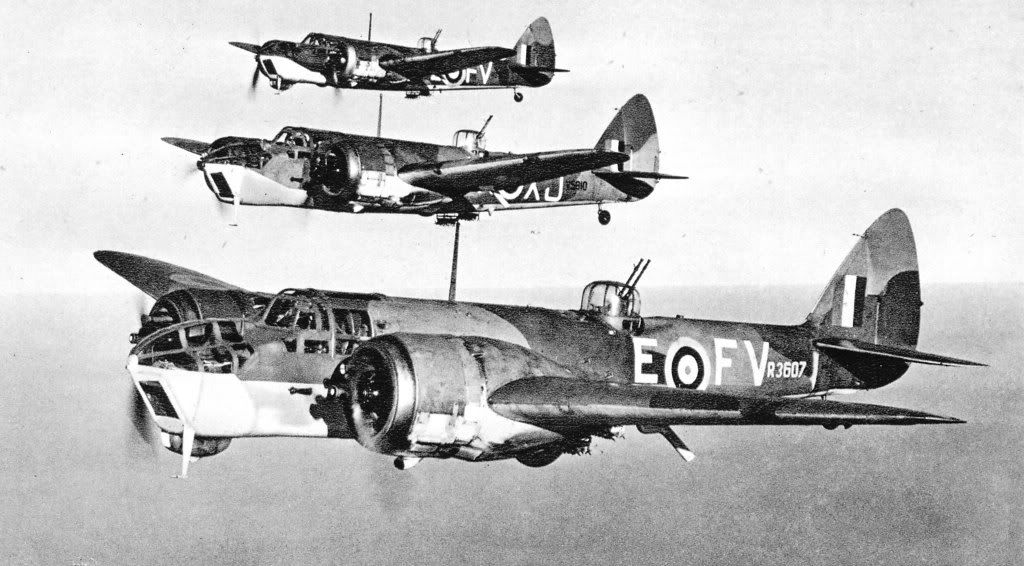 Bristol Blenheims  A Bf 110C-2 of ZG 26 over the North Sea.
Last edited by RedToo; 03/23/09 08:00 PM.
My 'Waiting for Clod' thread: http://tinyurl.com/bqxc9eeAlways take sides. Neutrality helps the oppressor, never the victim. Silence encourages the tormentor, never the tormented.Elie Wiesel. Romanian born Jewish writer, professor, political activist, Nobel Laureate, Holocaust survivor. 1928 - 2016. Indeed the safest road to Hell is the gradual one - the gentle slope, soft underfoot, without sudden turnings, without milestones, without signposts. C.S. Lewis, 1898 - 1963.
|
|
#2698867 - 03/27/09 08:33 PM
 Re: While we're waiting for BoB SoW: WWII BBC RAF Broadcasts
[Re: RedToo]
Re: While we're waiting for BoB SoW: WWII BBC RAF Broadcasts
[Re: RedToo]
|
Joined: Nov 2005
Posts: 3,072
RedToo

Senior Member
|

Senior Member

Joined: Nov 2005
Posts: 3,072
Bolton UK
|
Part 5 Norway. Pics this week of a Wellington (but not over Norway), Kristiansand, Emils and some happy German pilots. May, 1940 A RECONNAISSANCE OVER NARVIK BY A FLIGHT LIEUTENANT WING COMMANDER: It'll be a long time before anyone can tell the full story of the Allies' recent expedition to Norway. But one thing can be told even now�that whatever else it has done, the Norwegian campaign has proved once again that the R.A.F. can be relied on to do its job thoroughly under the worst possible conditions. It was no picnic this work of the R.A.F. over Norway, you can take it from me. Behind the official reports of reconnaissance flights, patrols and heavy bombing raids, there is a remarkable story of men and machines engaged in a struggle in which the odds were with the enemy from the start and not only with the enemy but with Nature as well. To put it bluntly, the Nazis got there first and having got there by means as ruthless as they were treacherous, they seized all Norway's available air bases. In the circumstances our fighters had only one base�and that an improvised one�from which to operate. That meant that our long distance bombers and long range fighters had to fly all the way from this country across at least 300 miles of sea before they could even get going with their job. But in spite of this our men and machines put up a fine show, and to-night I have brought to the studio a young Dominion pilot who was captain and first pilot of an aircraft which recently returned from the longest reconnaissance flight of the war� from Scotland to Narvik and back. The flight was even longer than those to Posen and Prague; it was certainly by far the longest over the sea carried out by land planes. During fourteen and a half hours' flying the pilot and crew were only over land for a few minutes. FLIGHT LIEUTENANT: I am a New Zealander. I come from Northcote, Auckland, and my crew are all members of the Royal Air Force New Zealand Bomber Squadron. My second pilot, who was a sergeant observer and acted as navigator, comes from Stratford, near New Plymouth, New Zealand; my wireless operator, who was a leading aircraftman, is also from Auckland. The aircraftman who was the air gunner, is also a New Zealander. We came to England last year to collect Wellington bombers to serve in New Zealand. Before we could get back the war started and we stopped on. WING COMMANDER: SO you will be here for a while? FLIGHT LIEUTENANT: It certainly looks like it. WING COMMANDER: Well, tell us something about this remarkable flight. FLIGHT LIEUTENANT: It was all kept pretty hush-hush before�hand. At our home station they simply told us to proceed to another station where we were to collect a Wellington for special reconnaissance work. We flew there and saw the Wellington that had been chosen for our flight. She wasn't a new or special type of aircraft�just an ordinary machine they had been using for training. WING COMMANDER: What sort of special preparations did you make? FLIGHT LIEUTENANT: It was an all-night job getting the aircraft ready, fitting the special tanks, loading up with ammunition, trying out the machine-guns, the wireless equipment and those hundred-and-one gadgets needed for navigation, then we flew to Scotland where we were told to be ready for a take-off the next morning at daybreak. In Scotland we made our final check up and filled up with petrol and oil. Our navigational equipment, by the way, included bomb-sight and drift-sight, sextant, compasses, charts, pencils, rubbers, dividers, parallel rules, protractors, and so on. WING COMMANDER: What sort of men were picked for the crew? FLIGHT LIEUTENANT: The whole crew was interchangeable. Everyone had to be able to do everyone else's job, even to piloting at a push, for there was no automatic pilot in the aircraft. We also had with us a Lieutenant Commander from the Navy to assist in identifying ships at sea. WING COMMANDER: HOW did you guard against the chance of a forced landing in the sea? FLIGHT LIEUTENANT: We carried a collapsible rubber dinghy safely tucked away behind the engine. Then what happens is this: If we have to use it, we pull a wire which forces the dinghy out of the aircraft. It is immediately inflated automatically and ready for use, complete with its own supply of distress signals. WING COMMANDER: And what do you carry in the way of food in case you are forced down? FLIGHT LIEUTENANT: Mostly "hard tack"�tinned beef, sardines and chocolate. Before taking off we removed the oxygen bottles from the aircraft because we didn't intend to hit the heights. That meant a saving in weight. WING COMMANDER: You had cameras with you, of course? FLIGHT LIEUTENANT: Yes. We had two cameras on board, one for vertical pictures and the other for oblique pictures. The next morning at dawn we were told what the job was�we were to reconnoitre the Norwegian coast to the Lofoten Islands and the Vest fjord to Narvik. WING COMMANDER: What time of day was it when you started off? FLIGHT LIEUTENANT: We took off in the early morning, flew once round the aerodrome and then out to sea in a bee-line for Narvik. We skirted the Shetland Islands at a steady speed of nearly 200 miles an hour, and we were soon out of sight of land. It was a bumpy day. We ran into some extraordinary weather with heavy rain squalls, and finally, just as we were coming near the Norwegian coast we headed into a snowstorm. For quite a while our instruments were registering twenty-seven degrees of frost. As we came in sight of the Norwegian coast we got ready� ready for anything. The wireless operator manned the front gun; the second pilot took over at the astro-hatch, acting as a fire-control officer, and the rear gunner took his place in his turret. Norway at that moment looked all covered in deep snow, but still it was land and any sort of land was welcome. WING COMMANDER: I can quite believe that. FLIGHT LIEUTENANT: Our real work had now begun, although the weather was steadily getting worse. There was a high wind by now and we were flying in and out of snow and sleet about 3,000 feet above the sea. There were such terrific bumps that the gunners bumped their heads as they were thrown upwards out of their seats. Just as we were going towards Vest fjord we met an enemy aircraft but he sheered off as soon as he saw us. We flew up the fjord through driving snow at only 200 feet. The clouds and cliffs seemed to be closing in on us, and when we got to the end of the fjord we swung round, made a sharp turn and went on with our reconnaissance southward down the coast as far as Christiansand, then we turned for home. WING COMMANDER: HOW did you manage about food and drinks all this time? FLIGHT LIEUTENANT: Well, up to this time we were too busy to bother about our rations and too excited. Now that the job was done we passed round hot coffee and sandwiches. We had six flasks of coffee with us, beef and ham sandwiches, chocolate, biscuits, chewing-gum, a packet of tea, six bottles of water, a billy-can and a "Tommy" cooker. WING COMMANDER: On the way back�what happened? FLIGHT LIEUTENANT: Not very much. That is to say nothing worse than bad weather. We sighted British Naval units in the North Sea, circled round them and exchanged signals by lamp. We were able to give them news of a couple of British destroyers and a merchantman we had seen at the entrance to one of the fjords. All the way home we had a strong wind against us and we were glad to see the Shetland Islands again. The flight covered well over 2,000 miles and the second pilot and I before we finished had shared between us fourteen and a half hours at the controls. As soon as we landed we were given hot drinks before we began to make out our reports and had the photographs we had taken developed. WING COMMANDER: It was a very fine show all round. 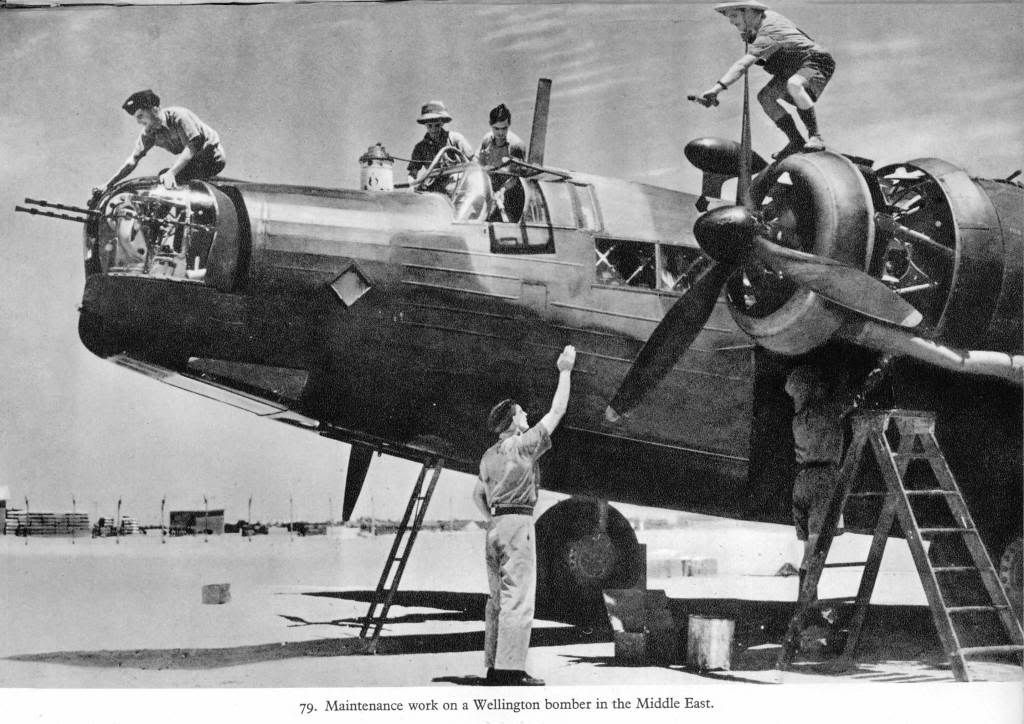 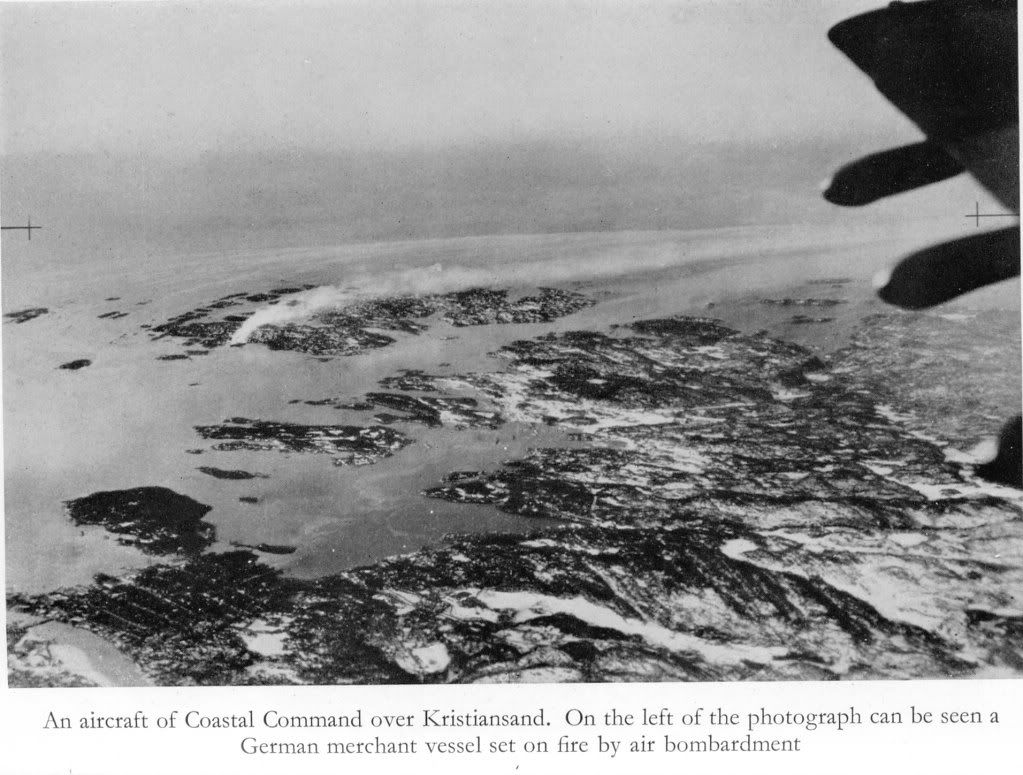 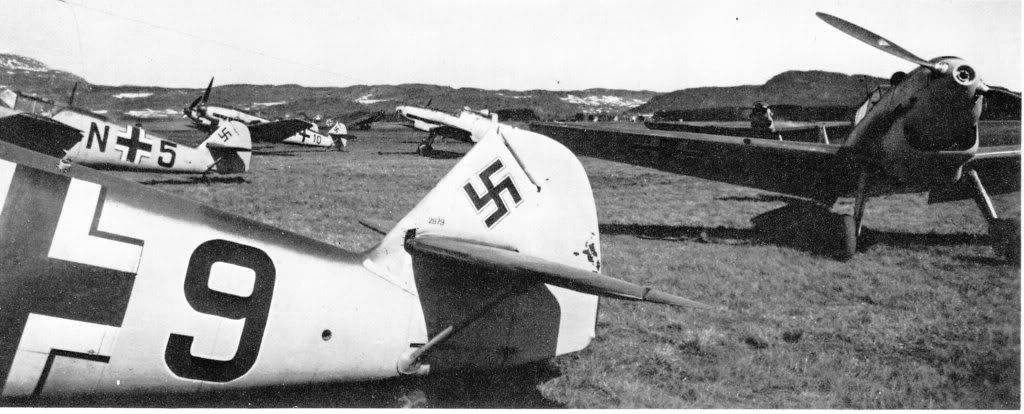 109 E-2�s in Norway. 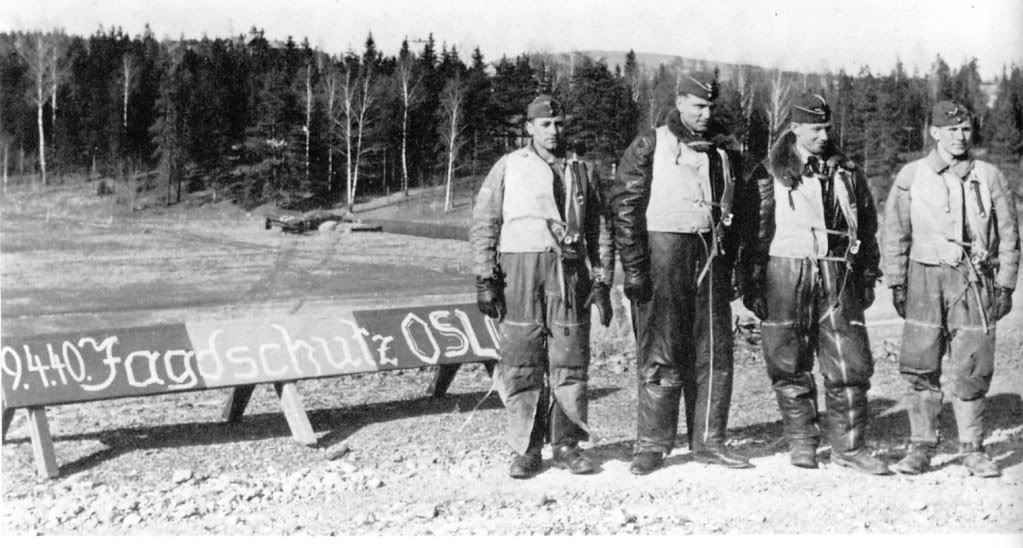 A picture to commemorate the dramatic capture of Oslo from the air. The third pilot from the left is Helmut Lent. RedToo.
My 'Waiting for Clod' thread: http://tinyurl.com/bqxc9eeAlways take sides. Neutrality helps the oppressor, never the victim. Silence encourages the tormentor, never the tormented.Elie Wiesel. Romanian born Jewish writer, professor, political activist, Nobel Laureate, Holocaust survivor. 1928 - 2016. Indeed the safest road to Hell is the gradual one - the gentle slope, soft underfoot, without sudden turnings, without milestones, without signposts. C.S. Lewis, 1898 - 1963.
|
|
#2702590 - 04/03/09 06:42 PM
 Re: While we're waiting for BoB SoW: WWII BBC RAF Broadcasts
[Re: RedToo]
Re: While we're waiting for BoB SoW: WWII BBC RAF Broadcasts
[Re: RedToo]
|
Joined: Nov 2005
Posts: 3,072
RedToo

Senior Member
|

Senior Member

Joined: Nov 2005
Posts: 3,072
Bolton UK
|
Part 6 � Hurricanes! June, 1940 A FIGHTER SQUADRON OVER FRANCE BY A SQUADRON LEADER I am the leader of a squadron which has been helping the B.E.F. We have gone up daily from quiet aerodromes in England to fly over the Dunkirk beaches. Day after day we saw the smoke from the innumerable fires of Dunkirk blowing down the Channel. It followed the coast like a gigantic piece of black cotton-wool. And we knew that beneath it, the B.E.F. were fighting their tremendous rearguard action. We could see the hundreds of little ships which were helping them to escape. At one moment we'd be smelling the fresh-cut grass of peaceful English fields and looking at the lupins in front of the mess. Half an hour later we'd be in the thick of it. Thirty German bombers and fighters have been shot down by my squadron and quite a large number crippled, though we did not actually see them crash. Two of my flight commanders have been awarded the Distinguished Flying Cross. 1 suppose our best and most exciting day was when we had a "brush" with a bunch of Messerschmitt 109s�our first combat with enemy fighters. We got two at about 1,500 feet. That was in the morning. In the afternoon we were standing near our aircraft�we landed for a short time in France�when we heard aeroplanes overhead, above the clouds, which were at roughly 5,000 feet. Suddenly we heard machine-gun and cannon fire coming from "upstairs". We leaped into our Hurricanes to join in. We raced up towards the fight, but before we had reached the cloud base, I saw two Messerschmitt no fighters come streaming down in flames through the clouds. Each was without tail and rudders. As soon as we came above the clouds we ran smack into a hectic battle. There was a large number of Messerschmitts and another squadron of Hurricanes were doing their stuff. The moment I came through the clouds I saw a Me.110 with a Hurricane on its tail about 200 yards behind. The Messerschmitt flew right across my sights. I swung slightly round and delivered a quarter attack, hit him, and then left him to the other Hurricane to finish off. I looked round quickly to find a target, and it was a good job for me that I did. There was another Me. 110 right on my tail, ready to give me the K.O. I don't think I ever moved so quickly in all my life. I pulled the stick back hard, went up and round as swiftly as that Hurricane would get round, and found myself a second or two afterwards immediately behind the Me. I had simply outmanoeuvred him, thanks largely to the way you can pull a Hurricane about in the sky. I immediately blazed away at him. It was nice range and a short burst was sufficient to send him streaking down in flames through the clouds out of control. We bagged eleven out of twelve that afternoon without losing one of ours. Later the same day we had another scrap in which we got a Heinkel 111 bomber and a Me. 110. Then there was one other day when we had an enjoyable dog-fight with a squadron of Me. 109s. We were accompanying two other fighter squadrons over Dunkirk and my squadron had orders to "sit tight upstairs". A huge formation of Heinkel 111s escorted by Me. 109s, arrived at the same time. We played ducks and drakes with them. It was not long before seven of the enemy's fighters were going down in flames. The rest turned tail and limped for home, leaving the bombers to the mercy of our fighters. Although they greatly outnumbered us, the bombers soon panicked. They unloaded their bombs anywhere, mostly into the sea. I have never seen anything like it. There was no attempt to hit anything, though there were ships about. One of my pilots who had some ammunition left went down and shot two of the Heinkels into the sea and when we got safely back to our base our only casualty had been a pilot with a bullet through his foot. We cleared the sky of Germans in twenty minutes. It was a grand day. These Time Life images of 85 Squadron go well with the above account. 85 Squadron served in France before returning to England and the Hurricane in these pics shows evidence of wear and tear:        Who can name the pilot?
Last edited by RedToo; 09/14/12 03:30 PM.
My 'Waiting for Clod' thread: http://tinyurl.com/bqxc9eeAlways take sides. Neutrality helps the oppressor, never the victim. Silence encourages the tormentor, never the tormented.Elie Wiesel. Romanian born Jewish writer, professor, political activist, Nobel Laureate, Holocaust survivor. 1928 - 2016. Indeed the safest road to Hell is the gradual one - the gentle slope, soft underfoot, without sudden turnings, without milestones, without signposts. C.S. Lewis, 1898 - 1963.
|
|
#2707810 - 04/13/09 09:00 PM
 Re: While we're waiting for BoB SoW: WWII BBC RAF Broadcasts
[Re: RedToo]
Re: While we're waiting for BoB SoW: WWII BBC RAF Broadcasts
[Re: RedToo]
|
Joined: Nov 2005
Posts: 3,072
RedToo

Senior Member
|

Senior Member

Joined: Nov 2005
Posts: 3,072
Bolton UK
|
Part seven, enter the Hudson, which will feature several times in future talks. June, 1940 A FIGHT OVER THE SEA BETWEEN HUDSONS AND MESSERSCHMITTS BY A FLIGHT LIEUTENANT I was the leader of a flight of three Lockheed Hudsons on a reconnaissance patrol the other day. We were suddenly attacked by a flight of German Messerschmitt fighters, which came screaming down out of the sun. We dived towards the sea in order to prevent them from getting beneath us and to allow our rear gunners to get to work. The Messerschmitts had the advantage of being faster than we were, so we remained in tight formation and dodged and twisted to break up their attacks. They were flying up behind us, shooting as they came, and then breaking away on either side to turn and renew the attack. Our Lockheeds were going hell for leather. I was wrenching the stick right over from side to side and keeping the engines at maximum boost the whole time. The air-speed indicator was showing about fifteen or twenty miles an hour more than the maximum claimed by the American manu�facturers. Even then I had something in hand, because, as leader, I had to make sure that the other two were keeping up with all I was doing. The nose cannons of the Messerschmitts were firing at us all the time. Puffs of smoke came from them with unpleasant regularity, like someone hurriedly blowing a lot of smoke-rings. In all we had fifteen attacks from each of them. Then they ran out of ammunition and went home. Our Lockheed Hudsons were still flying as well as ever, although the attacks had lasted for more than half an hour. By that time we had led them about 150 miles from land, and there is just a chance that the Messerschmitts would not have enough petrol to get back When we landed, we found that only one of our Lockheeds was at all badly hurt. It had received two cannon shots in the wings, one in the cabin, and one in the tail. Quite a lot of metal skin was blown off the wings, but the flying performance was very little impaired. One shell had come from behind, ripped through the wing to the main spar�and exploded there. The upper and lower surfaces of the wing looked like a sort of colossal nutmeg grater. By a stroke of good luck neither the flap nor aileron controls were affected. We tested the engines of all three aircraft. There wasn't a thing wrong with any of them. Another trip my flight of Lockheeds had was a bombing raid to Hamburg, in Germany. There was plenty of moonlight and acres of searchlights and buckets of A.A. fire, which nearly turned night into day. As we came near the oil tanks, which were our objective, we were about 15,000 feet up, and the A.A. shells were bursting in clusters of white lights around us. These seemed to float steadily in the air, in groups of half a dozen or so, and then go out. We flew through several puffs of smoke, all the time diving, climbing and turning to get out of the searchlights. Their glare prevented me from seeing the horizon, and we might have been on our heads or our heels. Then I spied the moon through the side window, and used it as a guide. Sometimes it was high above us, and sometimes it seemed to be below us, but it always helped us to get back on an even keel. Every now and then the Lockheeds would shudder violently as another shell exploded close by. We could hear shrapnel pounding into the fuselage with a sound like throwing a handful of stones sharply into a pond. The wireless operator, who had been looking out of the observation dome, had a lucky escape. He had gone back to his seat for a few moments when a lump of shrapnel tore straight through the cabin from one side to the other�just where he had been standing. We dropped our bombs beside the target and saw a fire break out before we sprinted for home. Suddenly we smelt petrol. I tested the tanks, and found one of them was losing fuel rapidly. Fortunately there was enough to get us back. When we landed, we had more than a score of shrapnel holes in the aircraft. Then we had quite a successful reconnaissance flight with bombs on board. Again we crossed the North Sea. We could not see the water because of fog. It lifted a little near the enemy coast, and we ran into broken cloud with a few showers. Suddenly we saw the German-occupied harbour below us. Several German supply ships were at anchor there, so we dived through the clouds for a thousand feet and dropped our bombs. As we shot back into the clouds, our rear gunner shouted into the inter-communicating telephone that we had scored a direct hit on one ship and left it burning furiously. There was a lot of A.A. fire and pom-pom fire about, but it never touched us. I am sure I am speaking for all the Lockheed Hudson pilots I know when I say we consider that they are first-class aircraft for the job of reconnaissance. They're comfortable to fly in, with plenty of space to move about, and there are practically no draughts. Naturally they have their limits when we are forced to use them as fighters or bombers�which is not work for which they are built�but we think they are fine kites. We are proud of them. 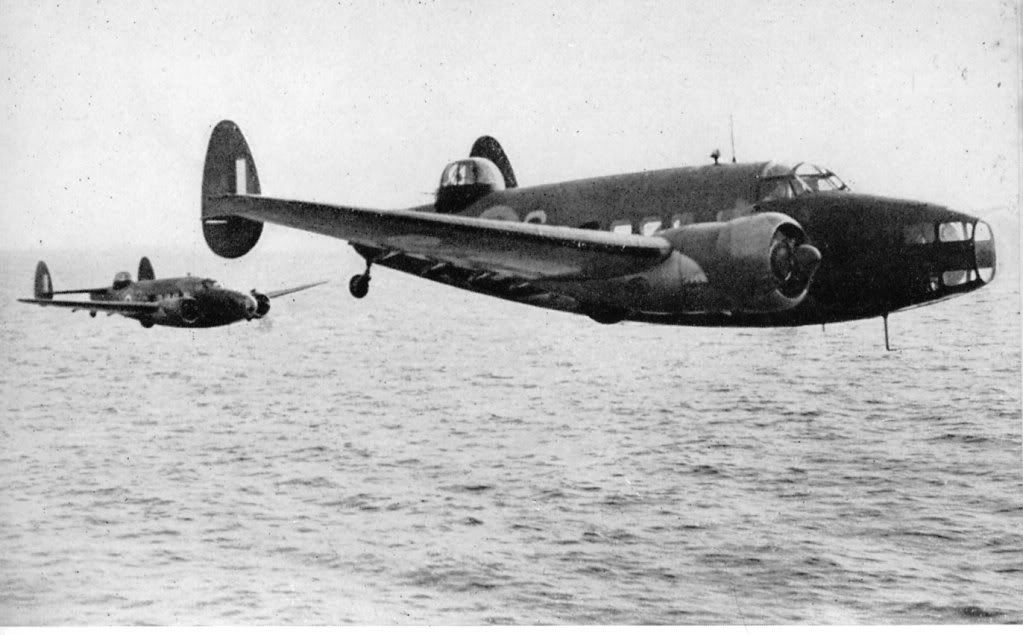 Hudsons over Heligoland � Two of a formation of these American-built Lockheed-Hudson aircraft which have been equipped with a deadly new gun turret. 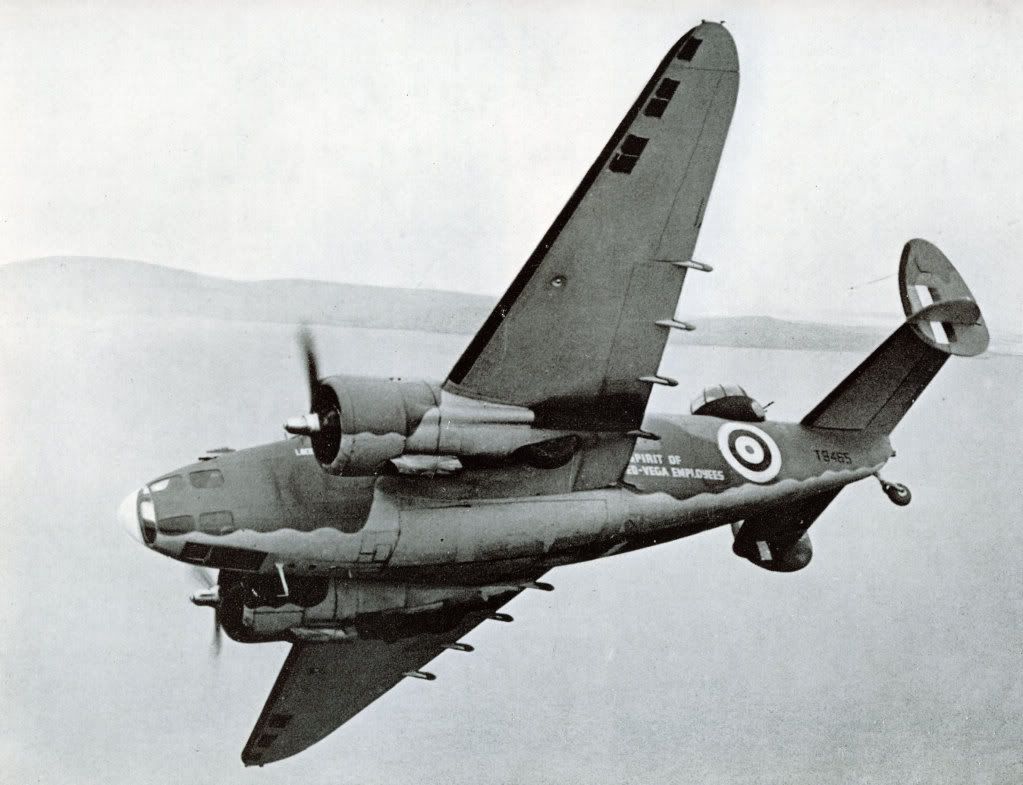 The Lockheed Hudson 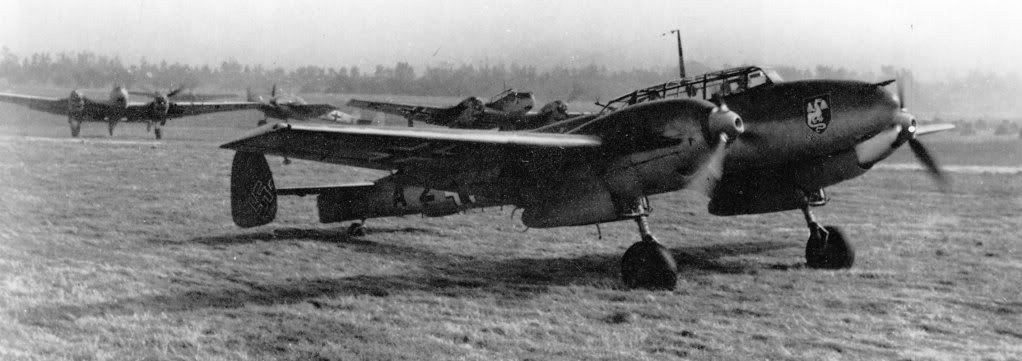 Bf 110C-2s on an airfield in the west, May 1940. The unit is the sole Gruppe of ZG 52, which was absorbed into ZG 2in July 1940.
My 'Waiting for Clod' thread: http://tinyurl.com/bqxc9eeAlways take sides. Neutrality helps the oppressor, never the victim. Silence encourages the tormentor, never the tormented.Elie Wiesel. Romanian born Jewish writer, professor, political activist, Nobel Laureate, Holocaust survivor. 1928 - 2016. Indeed the safest road to Hell is the gradual one - the gentle slope, soft underfoot, without sudden turnings, without milestones, without signposts. C.S. Lewis, 1898 - 1963.
|
|
#2710461 - 04/19/09 09:44 AM
 Re: While we're waiting for BoB SoW: WWII BBC RAF Broadcasts
[Re: RedToo]
Re: While we're waiting for BoB SoW: WWII BBC RAF Broadcasts
[Re: RedToo]
|
Joined: Nov 2005
Posts: 3,072
RedToo

Senior Member
|

Senior Member

Joined: Nov 2005
Posts: 3,072
Bolton UK
|
Part 8 � Hurricanes and He 113s June, 1940 THE STORY OF AN AMERICAN FIGHTER PILOT WITH THE R.A.F. An American-born fighter pilot tells something of his experiences and excitements he's been through while serving in the R.A.F. He has shot down eight enemy aircraft and badly crippled three or four more, and for these feats he was awarded the D.F.C yesterday. He is a Flight Lieutenant and his squadron has shot down more than fifty enemy planes. I was born of Welsh parents in Bernardsville, near Morristown, New Jersey, in 1913. My father ran a big farm there. I went to school first at the Morristown High School, and when we left there for Connecticut, I went to the Gilbert School in Winstead, Connecticut. We lived for a long time in New Hertford, Con�necticut, and I have many friends over there. I left the United States when I was about eighteen or nineteen years old. My parents who had gone out to America two years before I was born, came back and settled down in Bridgend, South Wales. I went to Cardiff College to study wireless for a while, and after doing this and that for a year or two, I took a short service commission in the R.A.F. That was in 1936. I was posted to a fighter squadron immediately I had finished my training, and here I am, still a fighter pilot, and liking it more and more each day. I got my first German in November, 1939. It was the first enemy aircraft to be shot down in the Straits of Dover in this war. I was on patrol between Deal and Calais, leading a section of Hurricanes from my squadron when we spotted, at 12,000 feet, a Dornier 17 "flying pencil". He was about 2,000 feet below us, and as we hadn't seen a German machine up to then, we went down carefully to make sure. We soon recognised him as an enemy, and as I turned to attack he tried to attack me. My Hurricane quickly outmanoeuvred him, I got on his tail, and gave him three sharp bursts of fire. Another member of the section got in three bursts too, as he dived towards the clouds. The last I saw of him was just above sea level. He had turned on his back, and a moment later crashed into the sea. When we got back to the mess we were handed a parcel. It con�tained a bottle of champagne�with the compliments of the Station Commander. You see it was our first fight�and we'd won. In those days, one German aircraft was something to celebrate. We went over to France on May 10th, when Hitler invaded the Low Countries. We went up that same afternoon. That time we didn't see anything, but the next day we really started. We carried out three patrols east of Brussels, and on the third patrol we saw three Heinkel 111s. We shot down one, and badly damaged the other two. The day after that, we got two Heinkel 111s, one of which was credited to me. I shot mine down from 12,000 feet. All the same, those skirmishes were child's play to what was to come later. On May 14th, after we had escorted a number of Blenheim bombers into enemy territory, we were on our way back when we saw three Dornier 17 Flying Pencils. It was a trap, for when we gave chase to the Dorniers, we suddenly found ourselves in the middle of between fifty and sixty Messerschmitt 109s and 110s. I was leading the flight that day and when I realised how hopelessly outnumbered we were, I gave orders to the boys to sort out their own targets and not to keep formation. We broke up and began to set about the Messerschmitts. I got four Me. 110s, and other members of the flight got four more. On the way back to our base, I saw two Heinkel 126s, one of which I shot down, and damaged the other with the rest of my ammunition. It was a good day. We routed an overwhelming number of enemy fighters, beat up two of their Army recon�naissance planes, and we all got home safely. Our bag on that day was six. There were six of us, so we averaged one each. There were several other days when we ran into heavy odds of enemy fighters. It is really amazing, looking back, that we should have had the success we had. But it certainly was a success each day. We never ran into the Germans without shooting some down. When we were patrolling Dunkirk, for instance, giving protection day after day to the B.E.F. we always got a few. I remember once, when we found ourselves in the thick of six squadrons of Me. 109s and 110s, we saw an unusual type of enemy fighter. They were the new Heinkel 113s. Naturally we couldn't resist the appointment. We got one of each type, and three or four of what we call "probables". I was attacking an Me. 110 when I suddenly realised that there were six Heinkel 113s on my tail. I made a very quick turn to get away from them, and then shot down the Heinkel 113 on the extreme left of that particular formation. That was in the afternoon. We had an "appetiser" before lunch, when we met twenty Heinkel 111 bombers. I got one. He went down in flames. And others of the squadron got their share. The smoke from innumerable fires in Dunkirk and other French coast towns was terrific about that time. A fellow pilot described it as being like a gigantic piece of cotton-wool lying right across the seashore, following the coast down the Channel as far as he could see, even from two or three miles up. There were times when we found that same smoke of great assistance in outwitting enemy fighters. One of our squadron, for instance, used up all his ammuni�tion in shooting down two Me. 110s one day, and found himself being chased by two more. Without ammunition he could do nothing, so he dived into the smoke over Dunkirk. He emerged above the smoke a few miles away, and there the Messerschmitts were still waiting for him. They simply stuck above the smoke waiting for him to emerge, a victim for their guns. But he outwitted them by diving back into the smoke and was able to slip away home, only to be off again into battle the same evening. We were stationed in France for eleven days. I remember that, when we went away, the roses were in bud; and when we came back they were in full bloom. In between we'd had eleven glorious days of action, but it was very hard work. 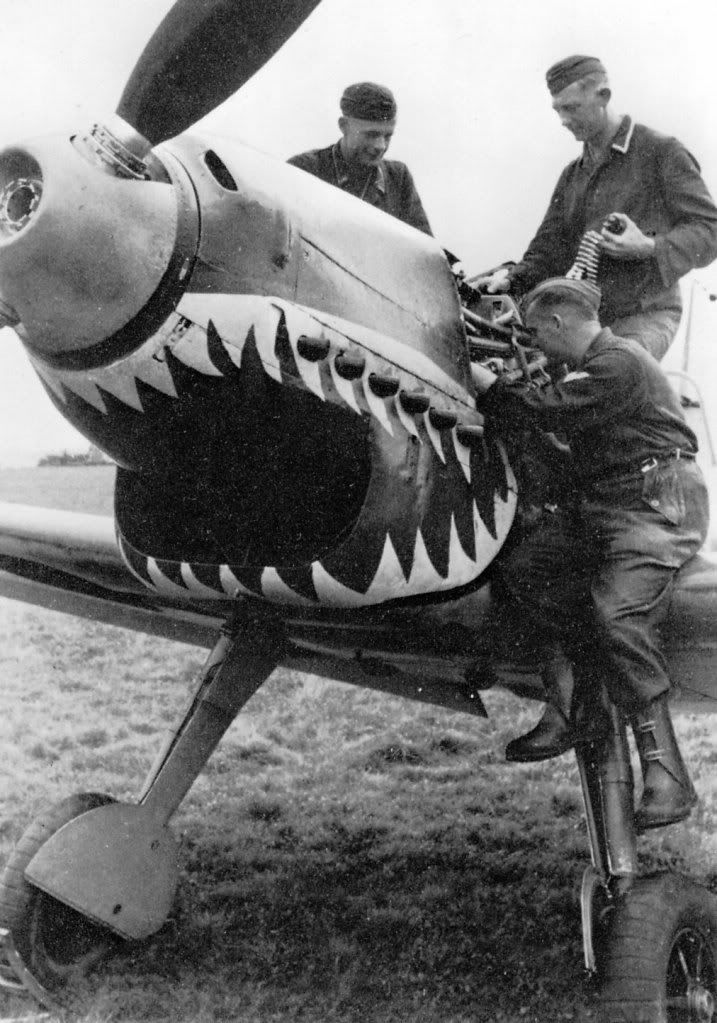 A shark-mouthed Bf 109C-2 of I./JG 71 (later II./JG 51).
My 'Waiting for Clod' thread: http://tinyurl.com/bqxc9eeAlways take sides. Neutrality helps the oppressor, never the victim. Silence encourages the tormentor, never the tormented.Elie Wiesel. Romanian born Jewish writer, professor, political activist, Nobel Laureate, Holocaust survivor. 1928 - 2016. Indeed the safest road to Hell is the gradual one - the gentle slope, soft underfoot, without sudden turnings, without milestones, without signposts. C.S. Lewis, 1898 - 1963.
|
|
#2713185 - 04/24/09 07:09 PM
 Re: While we're waiting for BoB SoW: WWII BBC RAF Broadcasts
[Re: RedToo]
Re: While we're waiting for BoB SoW: WWII BBC RAF Broadcasts
[Re: RedToo]
|
Joined: Nov 2005
Posts: 3,072
RedToo

Senior Member
|

Senior Member

Joined: Nov 2005
Posts: 3,072
Bolton UK
|
Part 9 � Lysanders. June, 1940 THE WORK OF AN ARMY CO-OPERATION SQUADRON IN FRANCE BY A WING COMMANDER I think I may say that the work of our Army Co-operation squadrons during the fighting in France and Belgium was of the utmost value. Broadly speaking, our job is to find out about enemy concentrations and movements either behind the front or in it, the existence of bases and trenches, the effect of artillery fire on targets, and to take photographs. Photography is a very important part of our job; camouflage, for example, may easily deceive the eye, but not the camera. Information obtained is then quickly passed back to the Army either by means of wireless or by messages dropped in little leaded canvas bags. And then the Army does its stuff. Reconnaissance often entails flying very low over the enemy to obtain results and machines are almost bound to be damaged by A.A. fire. The very first morning we established contact with the enemy one of my people had to go down to fifty feet to obtain the information he needed. He got it and got away. On another occasion I remember seeing one of our machines come back with one of its ailerons completely blown away and the pilot practically without any kind of control. But somehow he managed to land successfully, and after all-night work by the ground staff the wing was changed and the aircraft ready to fly again next morning. Another pilot of my squadron once found himself up against no fewer than six Messerschmitt 110s. He was flying quite alone, but by putting his machine into a steep spiral and so losing height rapidly to almost ground level managed to evade the Germans. Actually, although he ended up within only a few feet of the ground he contrived to return to our lines by hedge-hopping, dodging round church spires, and wriggling past various power cables and other obstructions. While all this was going on, his gunner was busy and shot down one of the Messerschmitts in flames and so badly damaged another that it flew clean out of the combat. One day one of our pilots was observing the forward movement of the enemy while British troops were being withdrawn, when he noticed in the distance German advance guards on bicycles, pedalling frantically along one of those long straight Belgian roads. The temptation was too much for our pilot, so down he dived at the cyclists, directing his front guns on them, and had them in such quick confusion that the leaders fell or were knocked off their machines. The result was that those in the rear ran into those in front and in a moment or two the whole road was a seething mass of overturned cyclists, most of them cursing, all of them trying to struggle into the nearest ditch. Then, as the aircraft rose again, the rear-gunner had a crack at them as well. In all the Corps Squadrons we have a very large number of airmen attached to artillery and other Army units to work the wireless receivers. On one occasion a party under a sergeant was detailed to the awkward job of holding up the enemy who were crossing a bridge. They managed it so well with their rifles that an Army officer described the incident to me as being worthy of the best British infantry, which I think was a pretty high tribute to men who are not trained as infantrymen at all. Others during the evacuation of Dunkirk helped actually to fire guns, and all of them assisted the Army units just as if they had been soldiers. On one occasion when a column of our transport was being heavily attacked from the air one of our operators saw a Bren gun which was not being manned. He at once jumped on the lorry and fired the Bren gun at a Heinkel and brought it down in flames with his first shot. He told me afterwards that the cheering which greeted his exploit lasted for some minutes. Besides this type of work squadrons of the Lysanders helped the ground troops greatly by dropping supplies of all kinds, including water and ammunition, on besieged garrisons, such as Calais and did so usually under the heaviest of enemy A.A. fire and the continual pestering of enemy fighters. Yet I believe I am right in saying that only one package dropped from the air fell outside the area occupied by our own forces�which says a great deal for the accuracy as well as for the determination of the pilots who dropped them. I don't know whether we will have to do this work over here, and if we do we have had pretty good practice at it. 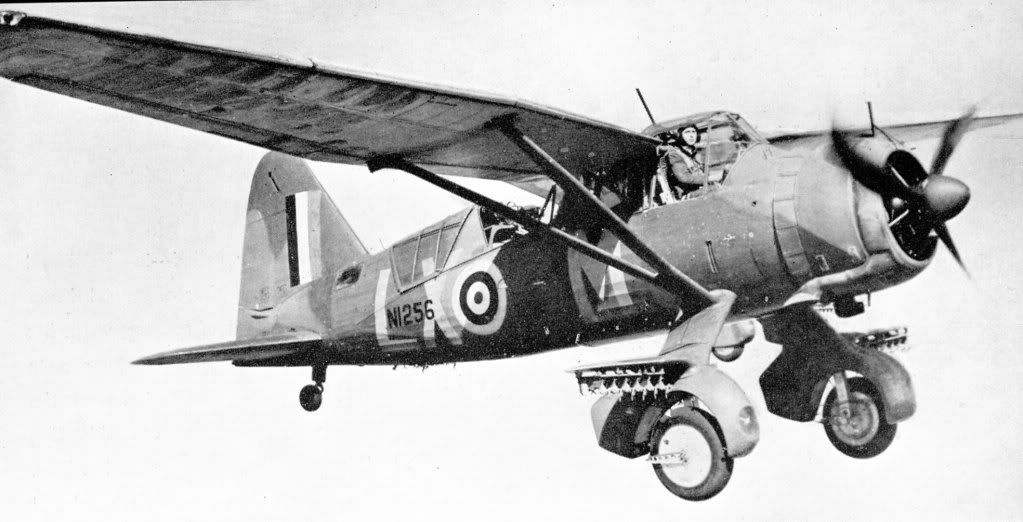 The Westland Lysander 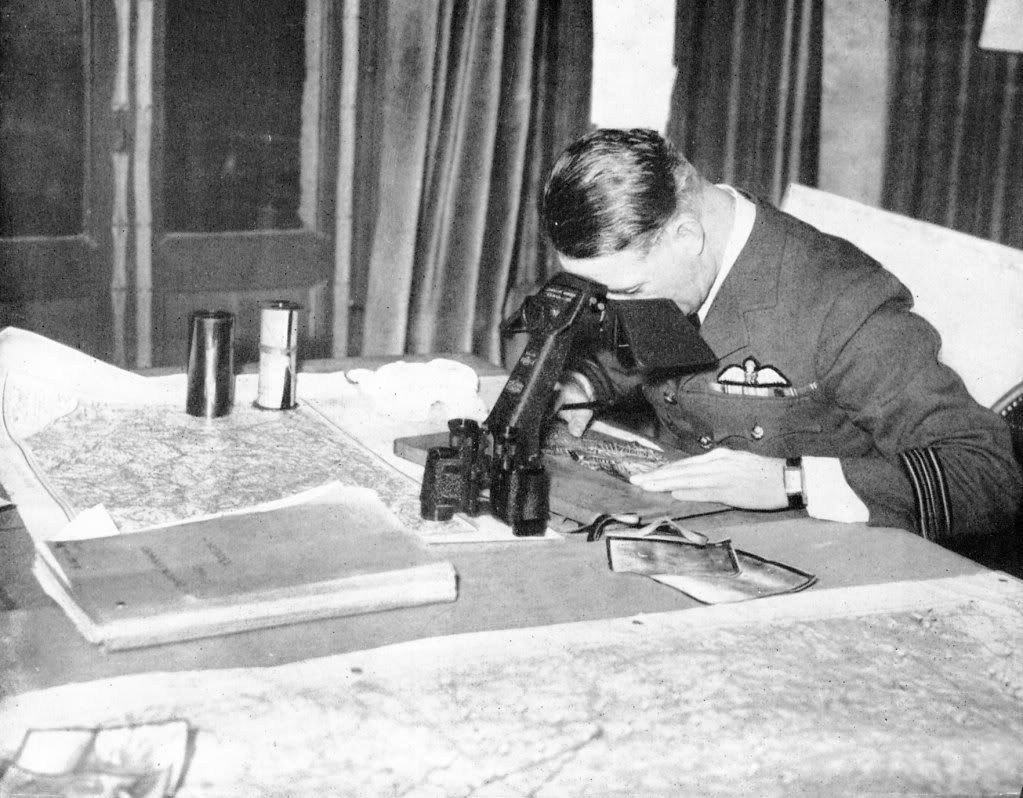 The Photograph Speaks. Photographs taken on reconnaissance flights are developed at once and examined by experts. 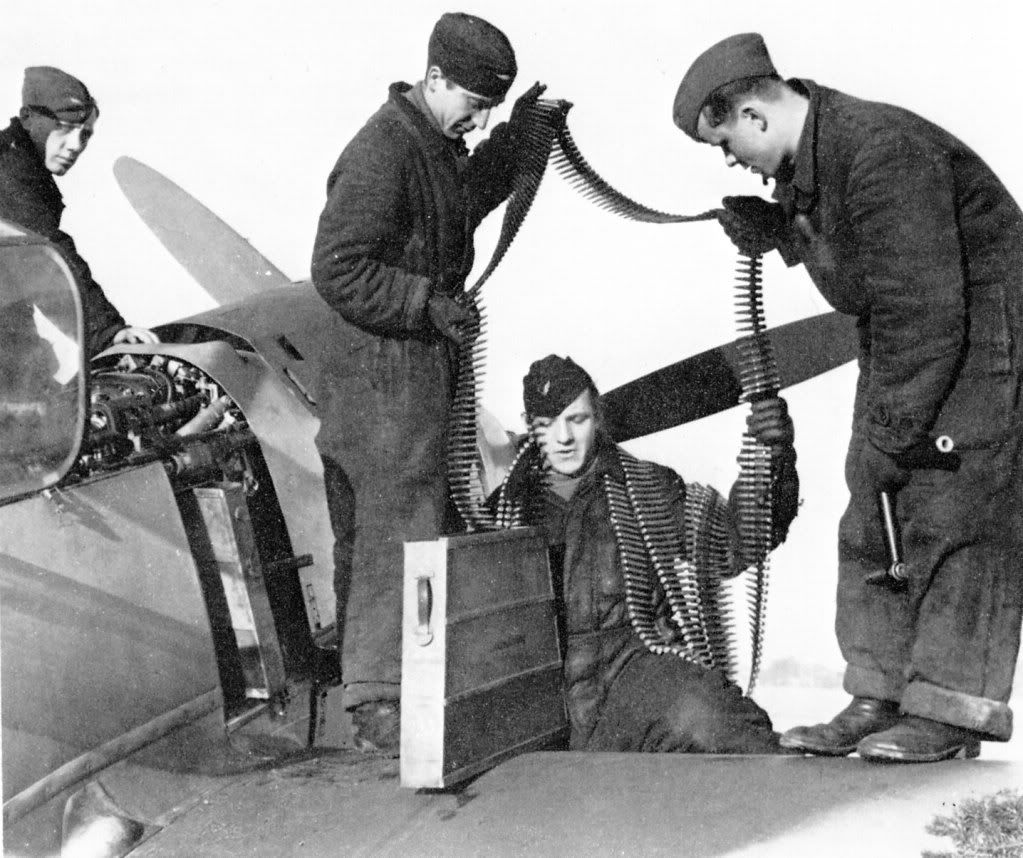 Armourers loading the synchronised MG 17s of a Bf 109E. 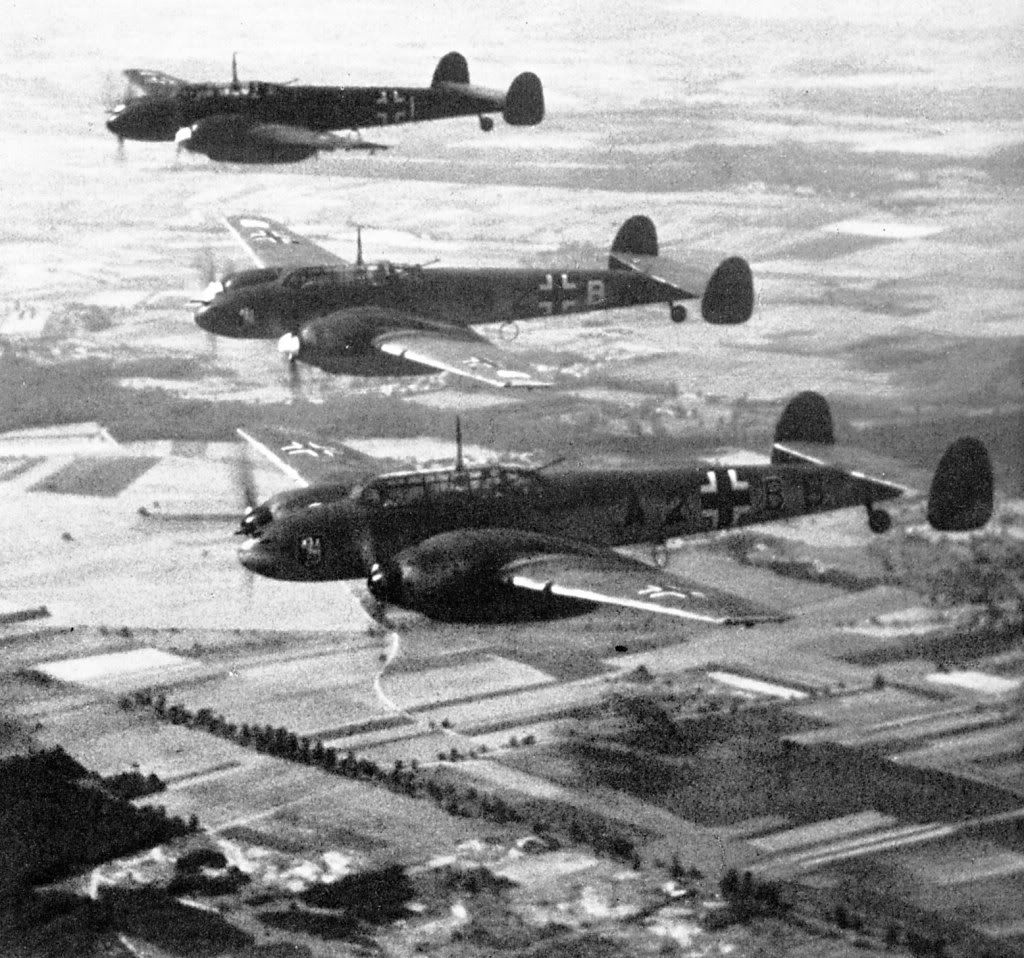 Bf 110C-2s of I./ZG 52.
My 'Waiting for Clod' thread: http://tinyurl.com/bqxc9eeAlways take sides. Neutrality helps the oppressor, never the victim. Silence encourages the tormentor, never the tormented.Elie Wiesel. Romanian born Jewish writer, professor, political activist, Nobel Laureate, Holocaust survivor. 1928 - 2016. Indeed the safest road to Hell is the gradual one - the gentle slope, soft underfoot, without sudden turnings, without milestones, without signposts. C.S. Lewis, 1898 - 1963.
|
|
#2716851 - 05/01/09 09:31 PM
 Re: While we're waiting for BoB SoW: WWII BBC RAF Broadcasts
[Re: RedToo]
Re: While we're waiting for BoB SoW: WWII BBC RAF Broadcasts
[Re: RedToo]
|
Joined: Nov 2005
Posts: 3,072
RedToo

Senior Member
|

Senior Member

Joined: Nov 2005
Posts: 3,072
Bolton UK
|
Fairey Battles this week. June, 1940 THE MAASTRICHT BRIDGE RAID BY A SERGEANT OBSERVER A few weeks ago the first V.C.s of the war in the air were awarded for the blowing up at Maastricht by R.A.F. bombers of two bridges of the utmost strategic value to the enemy. A call was made for volunteers for this desperate exploit and not a man held back. Of the fifteen who went out only one returned. Days later, however, another survivor turned up. All hope for his safety had been abandoned. He is the author of the following first-hand account of the attack. I suppose as a sergeant observer I ought to be able to give a good picture of that raid�and afterwards. But I doubt whether words could describe what really happened. As you probably know, the two bridges at Maastricht should have been blown up on the night of May nth, but for some unknown reason they were left standing. It was absolutely necessary that the bridges should be destroyed, for they were the only route open to the enemy, and I am quite certain that their eventual destruction by the R.A.F. did much to slow down the German advance. Our squadron leader asked for volunteers, and there is no need for me to tell you that not a single one of us hesitated. I wasn't there at the actual time, but when I arrived my pilot told me he had put my name down. I am glad he did. We had been up since three in the morning, and as we had a pretty strenuous time ahead of us my pilot decided on a few hours' sleep�but not before we had studied our maps and plotted out our route. Maastricht was about 100 miles away from our aerodrome, but from the preparations we made for the journey you might have thought we were off on a journey across miles of uncharted land. We are thorough about all our routes, of course, but the vital importance of this raid made us even more careful. It was absolutely essential that we should not waste any time in finding the bridges and it was absolutely essential that they should be destroyed. Five aircraft set out on the task. One flight of three were detailed to destroy the larger bridge and the other two bombers� in one of which I was the observer�had the smaller bridge to deal with. We were given a fighter escort of three aircraft which cheered us up, but unfortunately we were not to have their company for long. When we were about twenty miles from our target thirty Messerschmitts tried to intercept us, but we continued on our course while the three fighters waded into the attack. The odds were ten to one against us, but even so several of those Messerschmitts were brought down. And so we arrived near Maastricht. All the company we had was more enemy fighters and heavier anti-aircraft fire. The Messerschmitts attacked us from the rear. The first I knew about it was when our rear gunner shouted: "Enemy fighters on our tail. Look out, Taffy." Our pilot turned and took evasive action whilst the gunner shot one of them down. That seemed to frighten the others, for they soon sheered off. The barrage was terrific, the worst I have ever struck, and as we neared our target we saw the flight of three bombers, now returning home, caught in the thick of the enemy's fire. Later on all three were lost. The big bridge looked badly knocked about and was sagging in the middle. It had been hit by the bombs dropped by the three bombers ahead of us. When we delivered our attack we were about 6,000 feet up. We dived to 2,000 feet�one aircraft close behind the other�and dropped our load. On looking down we saw that our bridge now matched the other. It sagged in the middle, and its iron girders were sticking out all over the place. Immediately after we had dropped our bombs we turned for home, but the barrage was there waiting for us. It was even worse than before, and it was not long before our aircraft began to show signs of heavy damage. Soon the rear-gunner shouted: "They have got our tanks," and as it looked as if the machine would soon be on fire the pilot gave orders to abandon aircraft. The rear gunner jumped first. We saw nothing of him after that, though we believe he is in hospital somewhere. Then I jumped. The pilot remained with his aircraft and managed to bring it down safely. When I jumped we were near Liege. On the way down, I saw I was going straight for the Meuse, so I pulled my rigging cord on one side, altered my direction to make sure of falling somewhere in the town. But as I came near the ground I saw a reception committee waiting for me. Hundreds of people were dashing from one street to another and all were pointing at me. As I got nearer I realised that the mob was angry: they were shouting and waving their fists. I then began to wonder whether the river wouldn't be safer after all, but, by that time it was too late to change my mind. I landed in a small cottage back-garden. Before I had time to disentangle myself from my gear the crowd rushed into the next door garden and dragged me over the fence shouting: "Salle Boche", which means "Dirty German" and other insult�ing remarks. I shouted back: "Je suis Anglais," "I am English," but either they didn't believe me or didn't understand my French. Soon they had dragged me into the street where there were hundreds of people waiting. Men and women held my arms and an angry old man got ready to shoot me. Again I shouted: "Anglais," "Anglais," and I am glad to say somebody must have thought it just possible that I was telling the truth. The old man was prevailed upon to hand me over to the police. On the way to the police station burly women kept on trying to hit me. Then suddenly, out of the blue, I was spoken to in English by a Belgian woman who offered to act as my interpreter. I was grateful to her. She persuaded the police to send me to the Commandant of the Liege Fortress. She believed my story, offered me hospitality, gave me a bicycle and a map, and put me on the road to Namur. It was a long and adventurous journey�but that's another story. 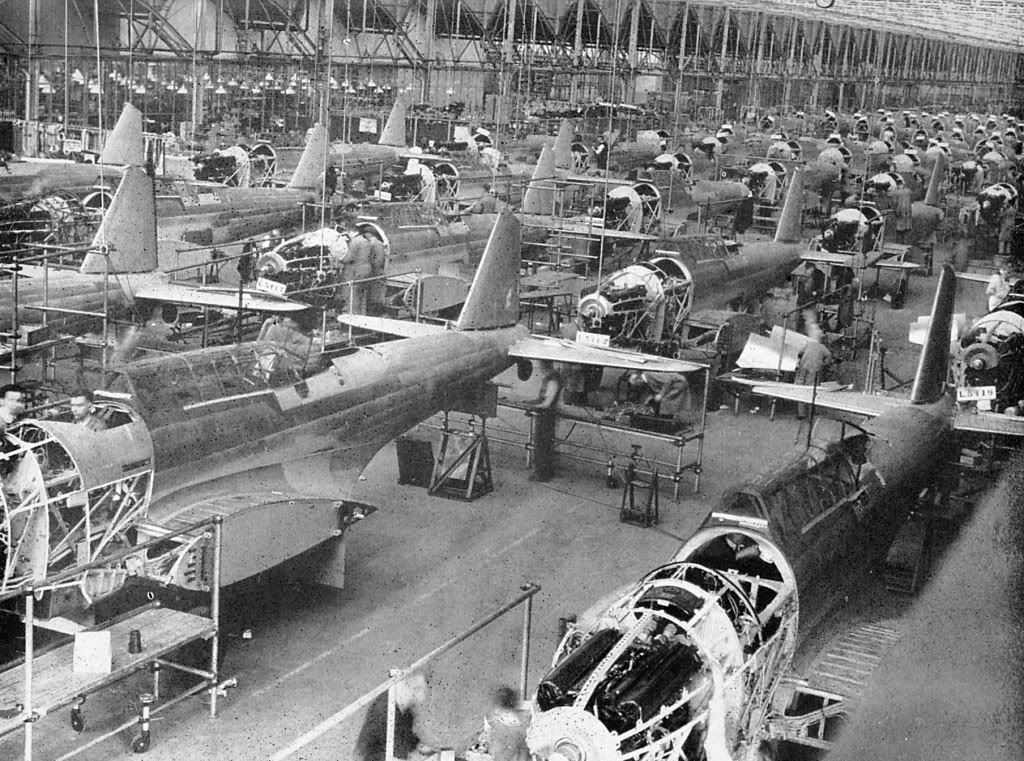 Fairey Battles under construction in one of the �Shadow� factories. 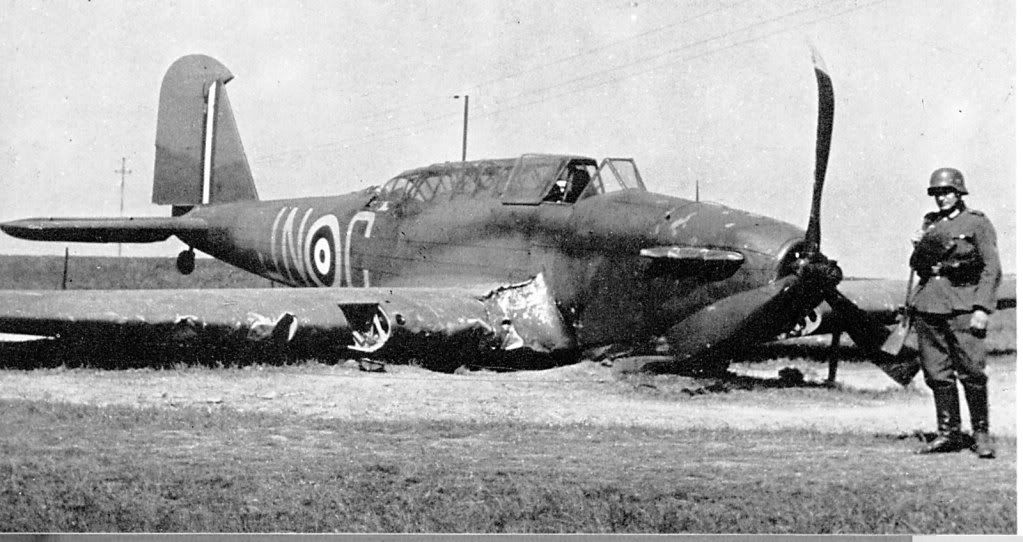 A Fairey Battle of 150 squadron crash landed in France. 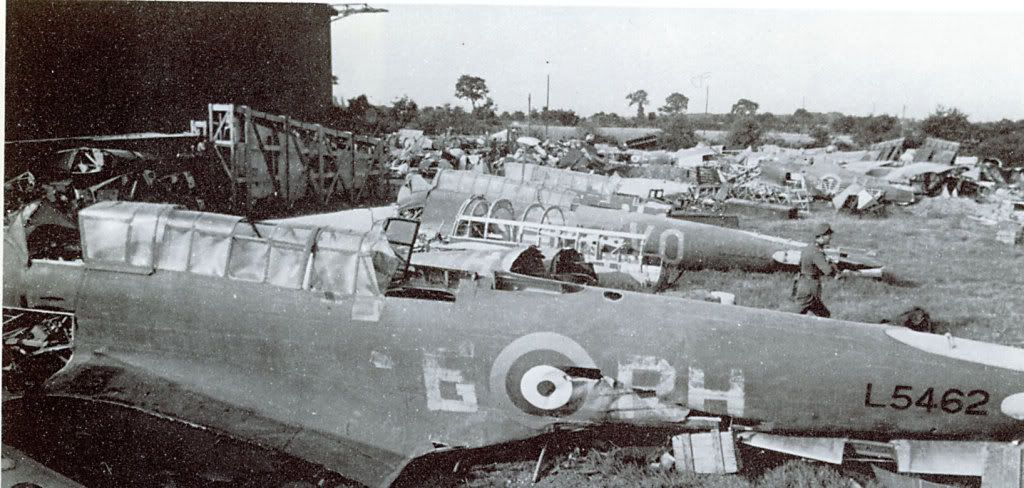 Fairey Battles in France awaiting scrapping. The nearest aircraft is from 88 squadron and the next from 98 squadron.
My 'Waiting for Clod' thread: http://tinyurl.com/bqxc9eeAlways take sides. Neutrality helps the oppressor, never the victim. Silence encourages the tormentor, never the tormented.Elie Wiesel. Romanian born Jewish writer, professor, political activist, Nobel Laureate, Holocaust survivor. 1928 - 2016. Indeed the safest road to Hell is the gradual one - the gentle slope, soft underfoot, without sudden turnings, without milestones, without signposts. C.S. Lewis, 1898 - 1963.
|
|
#2716872 - 05/01/09 10:06 PM
 Re: While we're waiting for BoB SoW: WWII BBC RAF Broadcasts
[Re: RedToo]
Re: While we're waiting for BoB SoW: WWII BBC RAF Broadcasts
[Re: RedToo]
|
Joined: Dec 2006
Posts: 1,600
Tbag

Member
|

Member
Joined: Dec 2006
Posts: 1,600
Haslemere, UK
|
Great read, time to make this a sticky IMO. Or no wait, better bump it constatly with new entries like you did in the past  Thanks RedToo!
The knack of flying is learning how to throw yourself at the ground and miss. - Douglas Adams
|
|
#2717400 - 05/03/09 10:18 AM
 Re: While we're waiting for BoB SoW: WWII BBC RAF Broadcasts
[Re: Tbag]
Re: While we're waiting for BoB SoW: WWII BBC RAF Broadcasts
[Re: Tbag]
|
Joined: Jun 2005
Posts: 8,231
Trooper117

Hotshot
|

Hotshot
Joined: Jun 2005
Posts: 8,231
UK
|
|
|
#2720628 - 05/08/09 07:16 PM
 Re: While we're waiting for BoB SoW: WWII BBC RAF Broadcasts
[Re: Trooper117]
Re: While we're waiting for BoB SoW: WWII BBC RAF Broadcasts
[Re: Trooper117]
|
Joined: Nov 2005
Posts: 3,072
RedToo

Senior Member
|

Senior Member

Joined: Nov 2005
Posts: 3,072
Bolton UK
|
Part 11. An early night fighter. June, 1940 BRINGING DOWN A NIGHT RAIDER BY A FLIGHT LIEUTENANT Tuesday's was the first night raid over our part of the coast. When the enemy were detected I was ordered to go up and look for them between midnight and 1 a.m. I flew around, peering into the gloom for some time, seeing nothing more than an occasional searchlight-beam snooping about the sky. I had almost begun to think that the Huns had managed to get away, when I suddenly spotted, a long way off, flashes from the ground and in the air. "A.A. fire," I thought; "that means the enemy." So I went over to have a look, and when nearly there saw a Heinkel sliding across the sky, really beautifully floodlit by our searchlights. A.A. fire was going off absolutely all around us. It really was a magnificent sight. After all, I had what you might call a ringside seat. I can imagine the feelings of the chaps at the other end of the searchlight beams (and the feelings of the Ack.-ack. gunner too), turning the handles and twiddling the knobs�in action at last on their first night's raid�the first time searchlights up this way have had a chance to catch the enemy. You see, we can always have fun flying, whether the enemy comes round or not, but the searchlight and A.A. boys have to sit there in the open, wet or fine, and just wait. But that's by the way. Well, now they really were at it. There was a simply terrific fireworks display in progress. The Heinkel looked to me rather like a puzzled old woman suddenly caught in the spotlight. I had come up more or less from behind and there he was just ambling and not quite knowing what to do. As a matter of fact, I imagined the pilot was pretty well dazzled with all the lights on him. I got into position right behind and just below, and got my sights on him and pressed the gun button. A shower of sparks flew out of the enemy, and clouds of smoke, and he wobbled a bit. Then he went down in a slow spiral dive into the darkness. That is the last I saw of him, though I did catch the glare of his incendiary bombs on the ground. He must have jettisoned them as he dropped. You feel more of a lone wolf during this night fighting than you do by day. We operate more on our own, but of course with our allies the guns and the searchlights. I expect you have wondered as you watched searchlights at work how much good they would be. As a matter of fact, we have wondered, too, what real chance they have of lighting up the raiders without lighting us as well. We have now had our answer. The co-operation between the air and ground defences really was a hundred per cent. 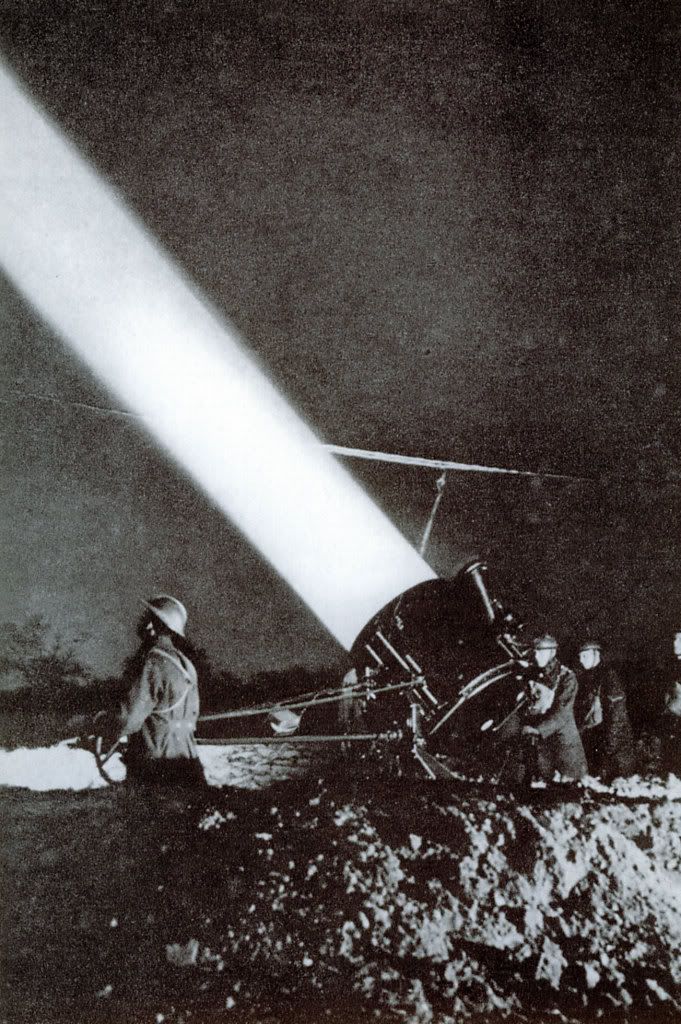 A searchlight of 210,000,000 candle-power probes the night sky with its beam.  Anti-aircraft women of the A.T.S. operating an identification telescope.  Sound Locator operated by women from the A.T.S.
My 'Waiting for Clod' thread: http://tinyurl.com/bqxc9eeAlways take sides. Neutrality helps the oppressor, never the victim. Silence encourages the tormentor, never the tormented.Elie Wiesel. Romanian born Jewish writer, professor, political activist, Nobel Laureate, Holocaust survivor. 1928 - 2016. Indeed the safest road to Hell is the gradual one - the gentle slope, soft underfoot, without sudden turnings, without milestones, without signposts. C.S. Lewis, 1898 - 1963.
|
|
#2725398 - 05/15/09 06:08 PM
 Re: While we're waiting for BoB SoW: WWII BBC RAF Broadcasts
[Re: RedToo]
Re: While we're waiting for BoB SoW: WWII BBC RAF Broadcasts
[Re: RedToo]
|
Joined: Nov 2005
Posts: 3,072
RedToo

Senior Member
|

Senior Member

Joined: Nov 2005
Posts: 3,072
Bolton UK
|
Part 12: The Battle of France July, 1940 A VETERAN PILOT RE-VISITS FRANCE BY A PILOT OFFICER Wing Commander: I hope you will forgive me this evening if I bring in a personal note. For I'm going to introduce to you an old friend of mine. Actually we were learning to fly together in 1913 before the last war. We trained together at the civil schools at Hendon on some of the curious and primitive machines of those early days�the comic box-kites and the funny little monoplanes which if they got off the ground at all staggered along painfully at about fifty miles an hour�rather different from the Wellingtons and the Hurricanes of to-day. But all the same, as you will hear later, it seems to have been quite a useful sort of training. Well, this friend of mine served all through the last war as a pilot in the R.F.C. and the R.A.F., and in 1918 ended up as a Wing-Commander with the D.S.O., the M.C. and the D.F.C. for his distinguished services. Although he left the R.A.F. after the war he kept up flying and from then onwards took an active and prominent part in civil aviation. Then, at the beginning of the present war, although now fifty years of age, he felt that he was still capable of doing a useful job of work in the air as an active pilot, so he joined up again in the R.A.F.�but this time as a pilot officer, the equivalent of a second lieutenant. How far he was justified in doing this you will be able to judge for yourselves from an account he is going to give you of an exciting incident in France in which he took part the other day and for which he was awarded a bar to the D.F.C. he had won twenty-two years ago. PILOT OFFICER: There were a good many of our aircraft in France about this time, standing by to meet the requirements of hard-pressed squadrons. Sometimes, extremely rapid evacuation had to be carried out and it wasn't always possible to get spare pilots for these aircraft at a moment's notice. Nor was it always possible to take airmen off operations to look after repairs. What we had to do, therefore, was to send out small detachments from home to do repairs and, when necessary, fly the aircraft back to England. My job was to look after one of these relieving parties at Merville. It was a fine morning when we left England. The pilot and I chatted about the weather, and then, as we flew over France, about the pathetic streams of refugees cluttering up the roads below us. The pilot was one you all know. He is one of the many in our civil air merchant-service whose almost daily deeds are thrilling the Empire and gaining the admiration of their brothers in the Royal Air Force. As we passed over the wooded country towards St. Omer, popping noises began to interrupt our conversation. At first we thought we were passing over French practice rifle and machine-gun ranges. But soon tracer bullets began shrieking up at us, and the pops became very sharp and nasty cracks. It was only then that we noticed about a dozen German tanks on the roadway under some trees outside a village. We could see quite plainly the Nazi swastika marked in black on a white circle covering the tops of the dull brown-and-green tanks. As we swooped over them, just over the tree-tops, the crews hurriedly drew some camouflaged netting over their markings. Then we caught sight of motor vehicles and troops who suddenly began diving into the ditches and firing at us. We flew lower still and hurried on. When we got to Merville, the fleet of civil air transport quickly unloaded their food and ammunition and left again for England for more. The rest of us settled down to servicing the Hurricanes we'd come to rescue and soon the first was away in spite of it being badly riddled with bullet-holes. The next one took longer, but by midday we were able to offer a fresh mount to a pilot who landed on us unexpectedly by parachute. He'd just had a desperate fight high overhead, thankfully accepted our offer and was soon off to rejoin his squadron on a strange mount�much to the astonishment of his flight sergeant. It was soon lunchtime. We had a lovely chicken stew, with many vegetables, made for us by a sergeant of a Northern regiment who had become detached from his unit after a scrap with the Jerries, together with ten lads from somewhere round about Sunderland. The sergeant was in fine form. So far, he told me, this war had just been his cup of tea. Later in the afternoon I discovered why. For while refugees wandered up and down the road according to the direction from which the nearest gunfire and sniping seemed to be coming, there he was, joining in the Bren-gun carrier section and having a crack at the He.s and Me.s when they came too near to be healthy. It was a fine sight. Just as we'd got the third Hurricane going, I was surprised to see one of our own aircraft leave a busy little dogfight, streak down towards us and drop the familiar little message-bag, telling me to bring the next serviceable Hurricane back home to England before nightfall. It was a strange sight in the sky�with a Tiger Moth and an Autogyro, bringing back sharp memories of peacetime flying, now floating around absolutely unconcerned on their message-carrying jobs. You might have thought they were helping the police to handle the traffic on Derby Day! I was glad of this message to bring the Hurricane home for more reasons than one. The main reason, I think, was that�well, I wanted to test a theory. The theory is that having once been taught to fly by the R.A.F., it doesn't much matter what type of aircraft you're asked to handle�provided you remember to turn all the taps and push and pull all the knobs of a modern aircraft in the proper sequence, and have the good sense to enquire about the aircraft's peculiar habits from someone who knows her ways. Simple enough�if you have time. The unfortunate part about it was that I just didn't have time. To cut a long story, the Merlin engine of my Hurricane took me off in grand style. Soon it throbbed gently into top gear. The boost came back, and the wheels came up and soon we were all set for Home, Sweet Home. I was above, in the air, without a care in the world�except that I was flying a machine I'd never handled before. Soon I was to be disillusioned. Not long after the take off, the nasty "noises off" started. Then tracer-bullets began coming down at me from the hillsides. Foolishly I shot up to about 8,000 feet to sail straight into a perfect pattern of horribly noisy black A.A. bursts. An entirely unorthodox manoeuvre got me sideways and down out of this, but not before the keen eye of the Messerschmitt flight commander had registered and dived to the attack simultaneously. The strip he tore off shook me more than the A.A. gentleman had done a few seconds pre�viously, and I slipped inwards towards the nasty noise and steeper down, changing the direction to meet the second strip from Number Two, from the other side, and wondering what the other four lads were up to above and behind. Thereafter, as I had not had the time of means to get the Hurricane's guns serviceable, the chase went on up the village street and down a chateau drive and once almost through the chateau front door, until suddenly, twisting downstream in a wooded valley, I slipped out clear over some sand dunes and out to sea, where the fleet off Boulogne opened up on the pack at my heels. One salvo was enough for them, and I climbed up leisurely and thankfully and perhaps a little regretfully to look back at the smoke of battle round Calais and Boulogne, a weird picture in the misty red light of the setting sun, and on the other side of me at the quiet peaceful countryside of Thanet. Then, home to roost, as I had done so many times twenty-five years ago, thinking of my son and his regiment somewhere inland from Dunkirk, and wondering what kind of miracle could save them all, and if the people at home had any real picture in their mind's eye of the scene so close to them on the other side. The refugees, the burning villages, the noise and smoke of battle, and how they would stand up to the onslaught if and when it came and would they remember the defeat in Flanders with no less honour than the victories which will follow in the last rounds of their fight for freedom. ... with a Tiger Moth and Autogyro floating around on their message-carrying duties:  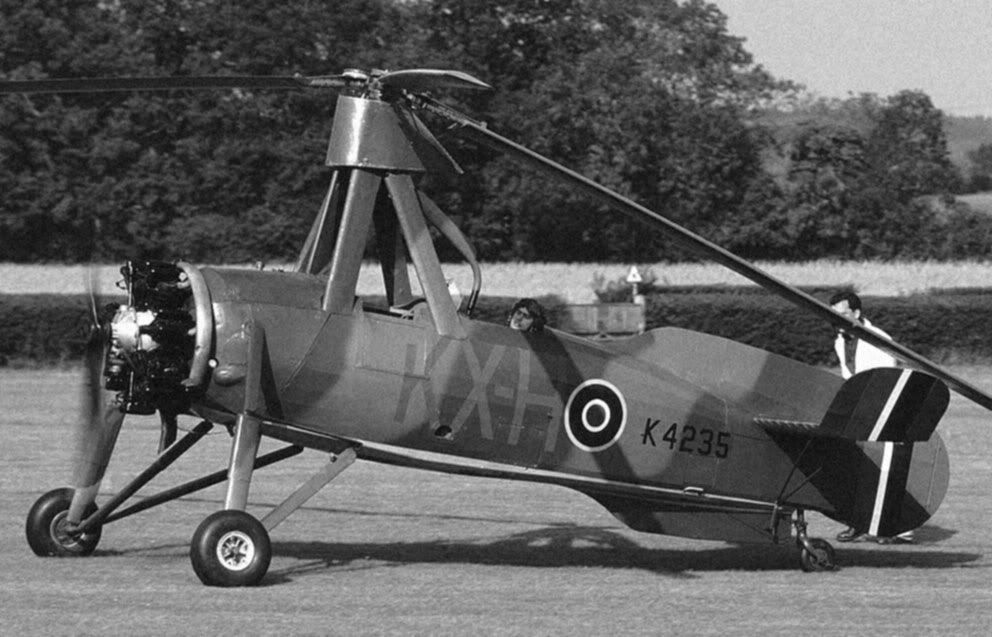 RedToo.
My 'Waiting for Clod' thread: http://tinyurl.com/bqxc9eeAlways take sides. Neutrality helps the oppressor, never the victim. Silence encourages the tormentor, never the tormented.Elie Wiesel. Romanian born Jewish writer, professor, political activist, Nobel Laureate, Holocaust survivor. 1928 - 2016. Indeed the safest road to Hell is the gradual one - the gentle slope, soft underfoot, without sudden turnings, without milestones, without signposts. C.S. Lewis, 1898 - 1963.
|
|
#2729884 - 05/22/09 05:44 PM
 Re: While we're waiting for BoB SoW: WWII BBC RAF Broadcasts
[Re: RedToo]
Re: While we're waiting for BoB SoW: WWII BBC RAF Broadcasts
[Re: RedToo]
|
Joined: Nov 2005
Posts: 3,072
RedToo

Senior Member
|

Senior Member

Joined: Nov 2005
Posts: 3,072
Bolton UK
|
Part 13 Air/ Sea Rescue. July, 1940 FOURTEEN HOURS IN A DINGHY BY A FLIGHT LIEUTENANT We were a few miles off the Dutch coast on our way back from a big raid over Germany when the port engine of our aircraft cut. We had plenty of height at the time so I told my wireless operator to send out a broadcast to say we were returning on one engine. After ten minutes' flying, however, the starboard engine started missing and we began to lose height. When we were about 3,500 feet I told my operator to put out an S O S and sent the crew to their emergency stations. There was very low cloud at the time we came out at about 500 feet. It was raining, and we did not actually see the water until we almost hit it. We tried to put the aircraft down on the water as gently as we could, but a rather heavy sea was running at the time and we hit a wave and the aircraft nose-dived in and went under. Three of the crew got out of the front hatch over the pilot's head, but the remaining three escaped from the hatch in the centre of the aircraft. It wasn't too easy for them. The others were actually under water and I could see them clutching the fuselage and trying to haul themselves up. When we had all got into the dinghy we discovered that the rear-gunner had the wireless aerial wrapped hopelessly knotted round his neck. We had no pliers but somehow the navigator managed to lay hands on a knife with which we cut the gunner free. After four and a half minutes the aircraft went down. The first thing that happened when we got into the boat was that the chaps got cramp. The first half hour was hell. We then decided to chuck off all the clothes we could spare. We threw away our shoes and flying boots, except the best pair, which we used as paddles and for baling out the dinghy. At the time heavy sea was running and drizzle was falling. It was a tough job getting the dinghy balanced. One of us lay in the bottom of the boat and five sat round the edge. I was very pleased to discover that the navigator had had the foresight to salvage the Very pistol and three cartridges. It must have been about seven o'clock in the morning when an aircraft which we took for a German flew over us. We fired a Very light but it took no notice of us and went on. Two hours later another aircraft, this time a British plane in search of us, flew straight over the top of us, but despite our signals did not see us. We then discovered that the Very cartridges had become swollen owing to the water and we had to spend about half an hour tearing off pieces of cardboard until we eventually got one to fit the pistol. We tried to steer a course due west hoping to reach England by paddling with the shoes, when at eleven-twenty we sighted another aircraft coming straight towards us. We waited until he was close and then fired a Very light�our last one, which the pilot spotted. He dived over us and then we recognised the machine as one of our own squadron. He circled round us for about two and a half hours and now and then sent messages with a signalling lamp saying that help was coming. But help didn't come until about four o'clock in the afternoon when we spotted an R.A.F. speed-boat coming towards us. Two and a half hours later we were landed. It was a pretty thick fourteen hours I can tell you, but some�how or other we managed to keep our spirits up, even after we discovered a leak in the dinghy and had to get the front gunner to stick his toe in it. The rear gunner sang to us for an hour and a half without stopping�Scottish songs, and finished up by swinging them. We also had a sweepstake as to what time we should be picked up, which was won by the wireless operator. Unfortunately, he was hours out�on the wrong side. But I still think the longest hours were whiled away by an argument we had about the wire�less operator who said he had been born with a caul and therefore couldn't be drowned�even though he could not swim. He was right after all.  Collapsible rubber dinghy automatically ejected from aircraft brought down on the sea. 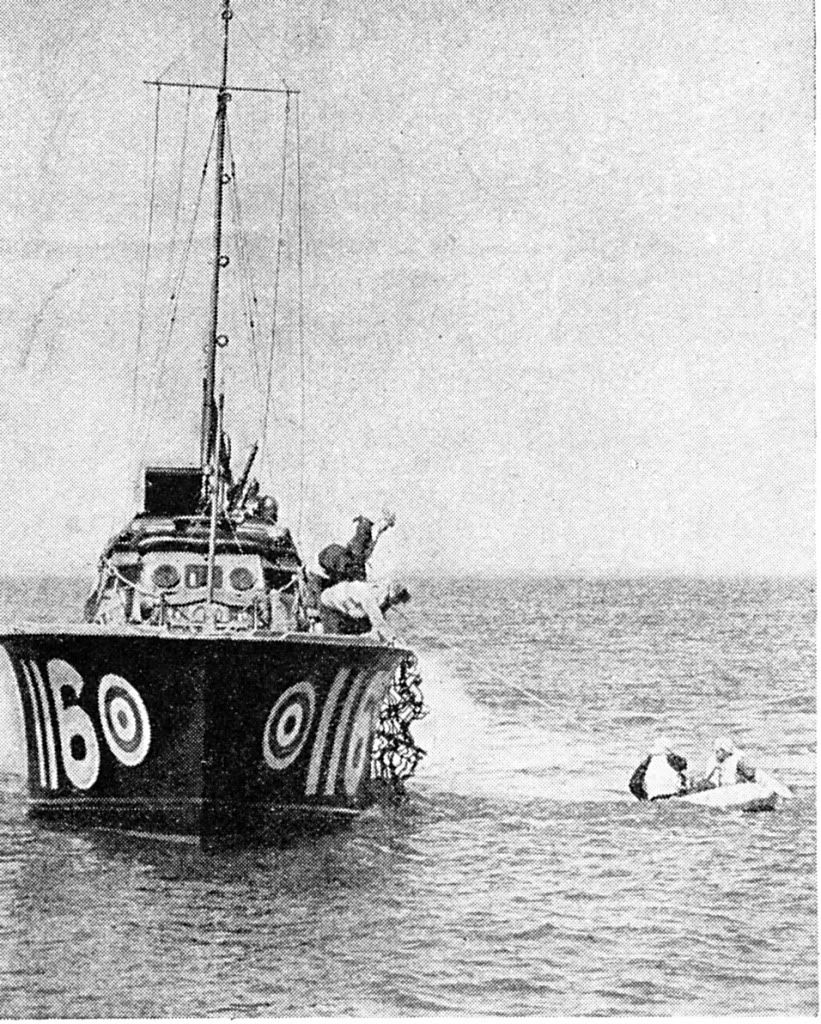 Air/ Sea Rescue Service at work.
My 'Waiting for Clod' thread: http://tinyurl.com/bqxc9eeAlways take sides. Neutrality helps the oppressor, never the victim. Silence encourages the tormentor, never the tormented.Elie Wiesel. Romanian born Jewish writer, professor, political activist, Nobel Laureate, Holocaust survivor. 1928 - 2016. Indeed the safest road to Hell is the gradual one - the gentle slope, soft underfoot, without sudden turnings, without milestones, without signposts. C.S. Lewis, 1898 - 1963.
|
|
#2734396 - 05/30/09 08:18 PM
 Re: While we're waiting for BoB SoW: WWII BBC RAF Broadcasts
[Re: RedToo]
Re: While we're waiting for BoB SoW: WWII BBC RAF Broadcasts
[Re: RedToo]
|
Joined: Nov 2005
Posts: 3,072
RedToo

Senior Member
|

Senior Member

Joined: Nov 2005
Posts: 3,072
Bolton UK
|
Part 14. July, 1940 BOMBING THE SCHARNHORST BY A SERGEANT AIR-OBSERVER The speaker is a Sergeant member of an air crew. He joined the R.A.F. on February 6, 1939. He has been on active service since the outbreak of war and is regarded as one of the most experienced men in his squadron. My job is that of air observer, which means that I am navigator, bomb aimer, and front gunner. There are five of us in the crew, and our routine work is long distance night bombing. We were ready to start as usual on Monday night, but when we reported for final instruction we found that a new job had been arranged. Information had come through that the Scharnhorst was in a floating dock at Kiel, for repairs, and we were to bomb it. We all had a feeling of general jubilation. We were glad to have the job. When the time came, with the good wishes of those who had to stay behind, our squadron got into the air very quickly. I gave my captain the first course to steer, and soon we were on our way, climbing through heavy, wet cloud. The temperature dropped considerably and was actually below freezing point, but apart from that it looked as though the weather was going to be good to us. We crossed over without incident until we reached the enemy coast, when searchlights fingered the sky without finding us. By this time it was a very clear night and we could see water reflections sixty miles away. Visibility was excellent. We flew on over enemy territory, meeting occasional A.A. fire and search-lights but we ignored them and picked up the part of the eastern coast line we were looking for, and with our maps pinpointed our exact position. Then we flew on to our target�the floating dock and the Scharnhorst. Everything was very quiet. The estuary was plainly marked, and as we approached we spotted the German balloon barrage, but still no ground defences were in action. It was now dead midnight. Just at that moment we saw the A. A. batteries open up on another of our aircraft that was making its attack. We located the position of the defences and decided how we would go in. We were flying fairly high. When we were in position, I gave the Captain the word "Now, sir", and he replied with "Over she goes", and, shutting off his engine, dived to the attack. I directed my line of sight on the floating dock, which stood out sharply in the estuary, and gave necessary correction to the captain. Searchlights caught us up in the dive, but we went under the beam. Then I had to put the captain into an almost vertical dive as we came on the target. The Scharnhorst couldn't be missed; she stood out so plainly. By this time a curtain of fierce A.A. fire was floating around us. The defences seemed to be giving everything they had got, and I could clearly see tracers of the pom-pom on the deck of the Scharnhorst at work. Besides that, the shore batteries and other ships in the harbour were doing their best to blow us out of the sky. We took several heavy jars from exploding shells. The lower part of the starboard tail plane was blown away, the main spar was hit, we got a two-foot hole through the tailplane, which broke a rib, and narrowly missed our rudder post and we had another hole a foot wide through the fuselage. The rear gunner said he expected to be launched into space any minute, because he felt sure the turret had been shot away. He gets the worst of the jolts back there and, on pulling out of a dive he swung through a much wider arc. But still everything held together, thanks to the splendid material and fine workman-ship that went to the making of our aircraft. We came down very low to make sure, and when we were dead in line I released a stick of bombs. At that moment, I could only see the ship�gun turrets, masts and control tower. A vast sheet of reddish yellow flame came from the deck, and what seemed to be the heart of the Scharnhorst, right from the edge of the dock across her. The flashes lit the whole estuary, and while we banked to go over the town it seemed as though I was looking up at other ships anchored in the estuary. We had finished bombing and went off, pursued by A.A. fire, and then circled for height over the quiet waters of the harbour. While we were doing this, we could see fires breaking out on the dockside, and our own comrades going in, one after the other to do their stuff. We saw their bombs exploding dead in the target area. The fires got bigger, and there were a lot of explo�sions that seemed to come from the middle of the fires until they merged into one vast inferno. One explosion outdid all the others and it was probably either an ammunition dump or oil tanks. When we began to climb we realised the damage that had been done to us, and so, on reaching height, I gave the captain a course for home. But while we were still over the estuary at only about 1,000 feet, a German A.A. ship opened fire. I turned my front gun and pumped about two hundred rounds at him and he ceased fire. We flew on down the enemy coast. The rear gunner was chattering all the time something about the fires. We didn't get what he meant at first, but when we were over the coast we turned the aircraft so that we could have a look and we actually pin�pointed the position, from which we could see it�I don't mean see the glow in the sky, but the actual fire. This distance was eighty-five miles. Then we sent a signal to base, giving our position and telling them that the aircraft was damaged so that they would know where to search for us if anything untoward did happen. That was the last message we were able to send as we flew into a storm which earthed the aerial and the radio went up in smoke. Still, damaged as we were, after crossing three hundred and fifty miles of sea, we struck our point only three miles off our bearing, and came quietly home and made a smooth landing. We were bubbling over with excitement at such a successful night's hunting�a bit tired but pretty certain that the Scharnhorst will be unserviceable for many months to come. 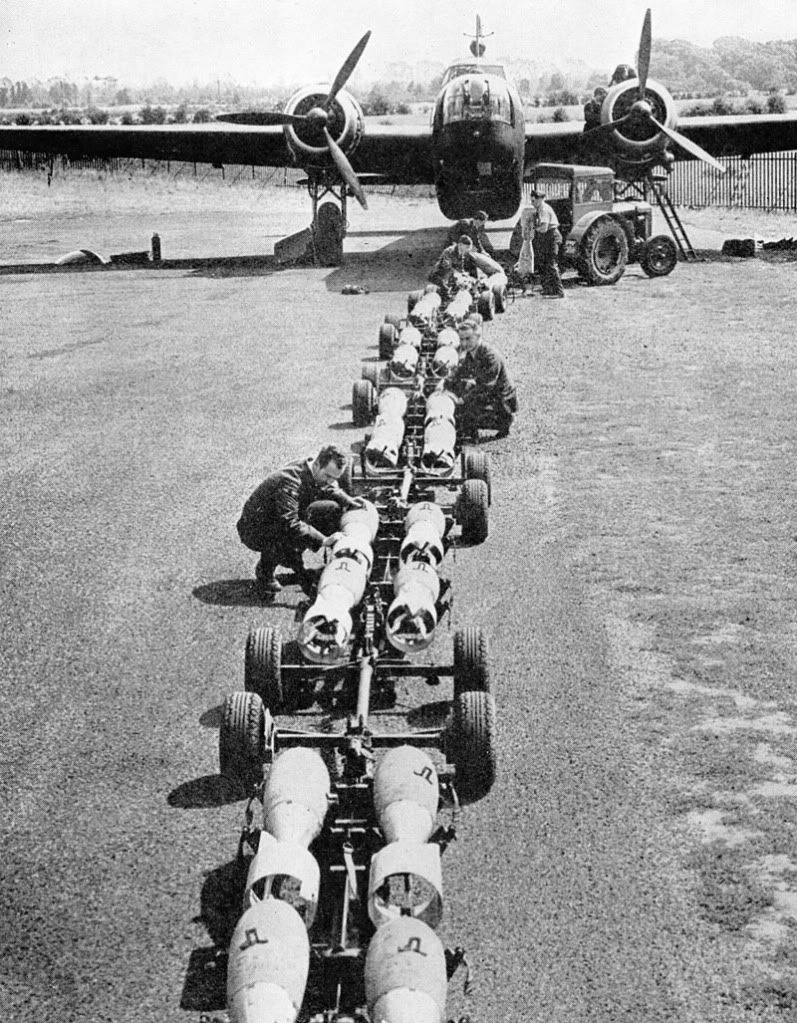 Loading a Wellington with 250lb bombs. 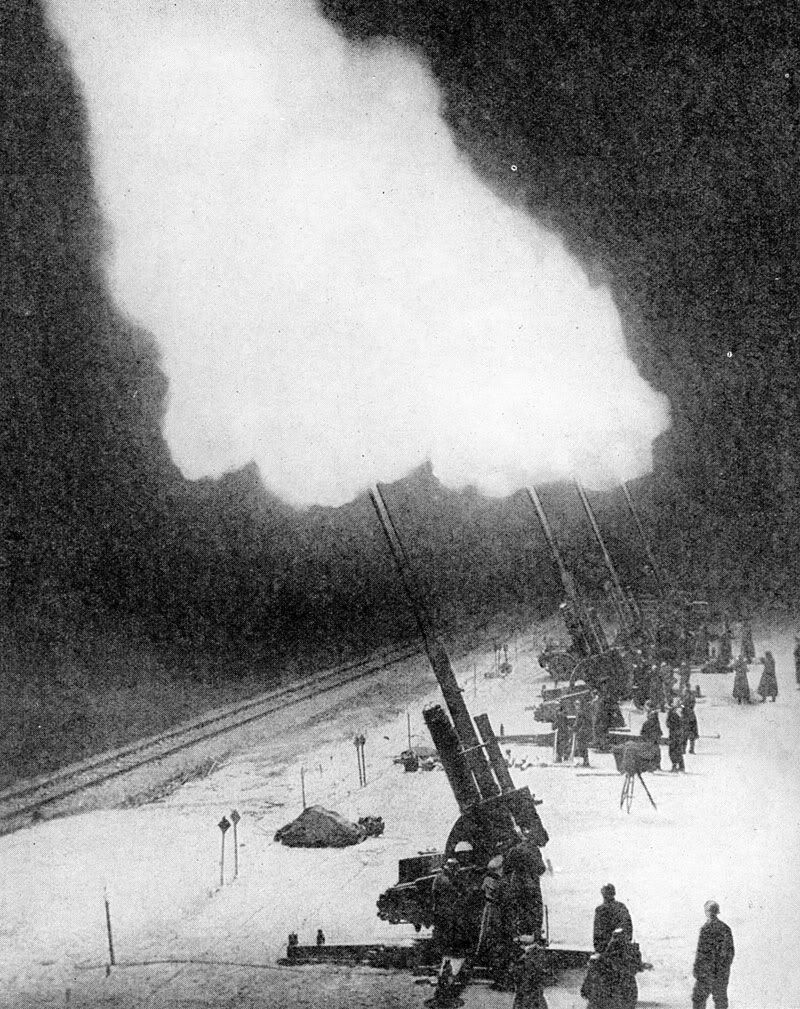 A German coastal battery.
My 'Waiting for Clod' thread: http://tinyurl.com/bqxc9eeAlways take sides. Neutrality helps the oppressor, never the victim. Silence encourages the tormentor, never the tormented.Elie Wiesel. Romanian born Jewish writer, professor, political activist, Nobel Laureate, Holocaust survivor. 1928 - 2016. Indeed the safest road to Hell is the gradual one - the gentle slope, soft underfoot, without sudden turnings, without milestones, without signposts. C.S. Lewis, 1898 - 1963.
|
|
#2737792 - 06/05/09 04:39 PM
 Re: While we're waiting for BoB SoW: WWII BBC RAF Broadcasts
[Re: RedToo]
Re: While we're waiting for BoB SoW: WWII BBC RAF Broadcasts
[Re: RedToo]
|
Joined: Nov 2005
Posts: 3,072
RedToo

Senior Member
|

Senior Member

Joined: Nov 2005
Posts: 3,072
Bolton UK
|
Part 15. July, 1940 A NIGHT FIGHT BY AN AUXILIARY SQUADRON LEADER The following story of a night combat is told by a young Squadron Leader of the R.A.F. who was awarded the D.F.C Night fighting is a fascinating game. It is rather like a game of rather noisy hide-and-seek or, better still, it is just like a game my brother and I used to play some years ago. We used to climb down into a large maze of stone quarries near our home and then start stalking each other. Our ammunition was sharp stones and the loser the first one to be hard hit. We used to play for hours wriggling on our stomachs slowly gaining a good position and then a hard throw. My brother could throw a cricket ball almost a hundred yards, so the tension was considerable. The other night at midnight the operational phone rang and I received orders to patrol a certain line. As I ran out to my fighter plane I could hear the sirens wailing in a nearby town. There was no moon and quite a lot of cloud. I took off and climbed through the clouds. I was excited, for I had waited for this chance for the previous three nights, sitting in a chair all night dressed in my flying clothes and one of those yellow painted rubber life jackets which we call Mae Wests. They are painted yellow so that if we are swimming for hours we can be more easily seen in the water. I had waited from dusk to dawn but nothing whatsoever would come our way, but this night they obviously were coming. I climbed to my ordered height and remained on my patrol line. After about an hour I was told by wireless that the enemy were at a certain spot flying from N.W. to S.E. Luckily I was approaching that spot myself. The searchlights which had been weaving about beneath light cloud suddenly converged at a spot. They illuminated the cloud brilliantly and there silhouetted on the cloud flying across my starboard beam were three enemy aircraft. I turned left and slowed down slightly. One searchlight struck through a small gap and showed up the whole of one plane. I recognised the plane as a Heinkel 111. One of the enemy turned left, I lost sight of the other. I fastened on to the last of the three. I got about one hundred yards behind and below where I could clearly see his exhaust flames. As we went out of the searchlights and crossed the coast he went into a shallow dive. This upset me a bit for I got rather high, almost directly behind him. I managed to get back and opened my hood to see better. I put my firing button to fire and pressed it. Bullets poured into him. It was at point-blank range. I could see the tracer disappearing inside but nothing seemed to happen, except he slowed down consider�ably. I almost overshot him, but put the propeller into the full fine and managed to keep my position. I fired again in four bursts and then noticed a glow inside the machine. We had been in a shallow dive and I thought we were getting near the sea, so I fired all the rest of my ammunition into him. The red glow got brighter. He was obviously on fire inside. At five hundred feet I broke away to the right and tried to follow but overshot, so I did not see him strike the water. I climbed and at a thousand feet pulled off a parachute flare. As the flare fell towards the sea I saw the Heinkel lying on the water, a column of smoke was blowing from his rear section. I circled twice but there was no movement; no one tried to climb out so I turned and flew for home.  A Hurricane night-fighter taxis to take off.
My 'Waiting for Clod' thread: http://tinyurl.com/bqxc9eeAlways take sides. Neutrality helps the oppressor, never the victim. Silence encourages the tormentor, never the tormented.Elie Wiesel. Romanian born Jewish writer, professor, political activist, Nobel Laureate, Holocaust survivor. 1928 - 2016. Indeed the safest road to Hell is the gradual one - the gentle slope, soft underfoot, without sudden turnings, without milestones, without signposts. C.S. Lewis, 1898 - 1963.
|
|
|
|
|
|
|
|
|
|
|
Exodus
by RedOneAlpha. 04/18/24 05:46 PM
|
|
|
|
|
|
|
|
|
|
|
|